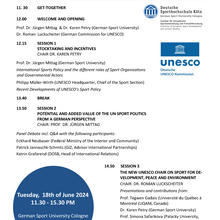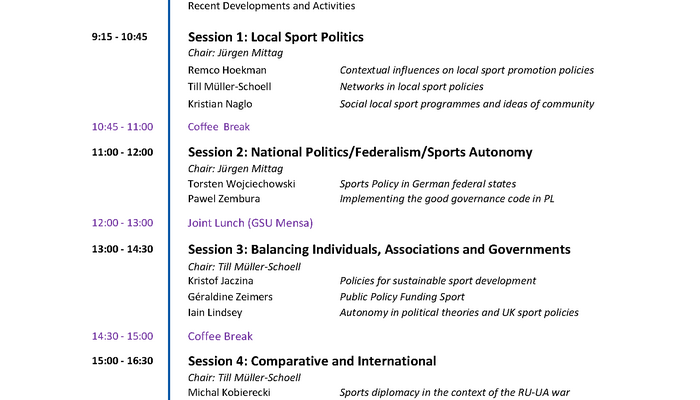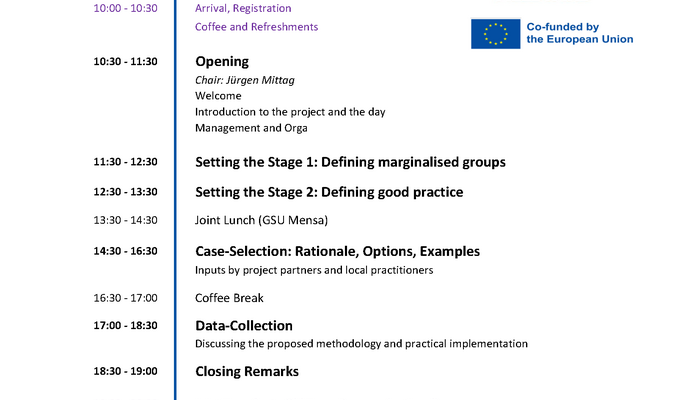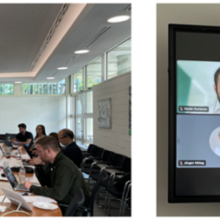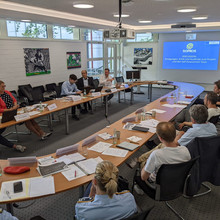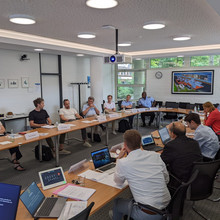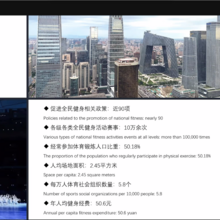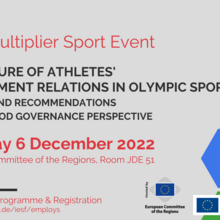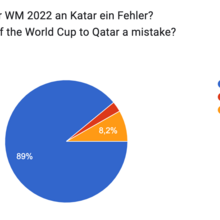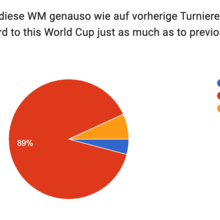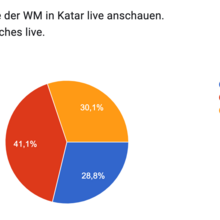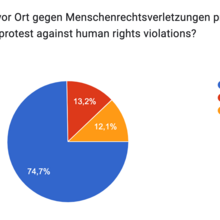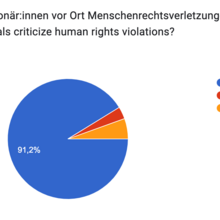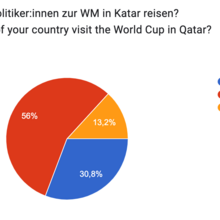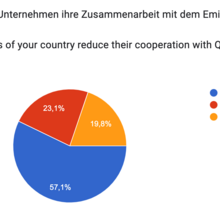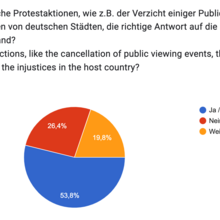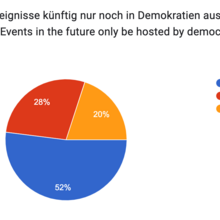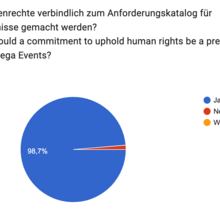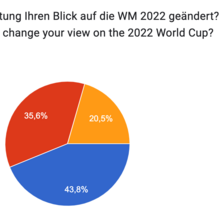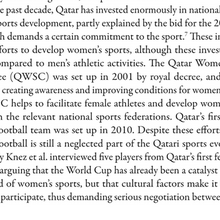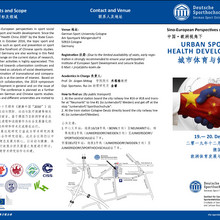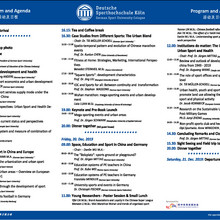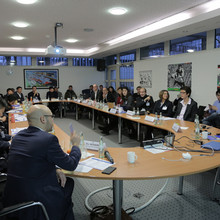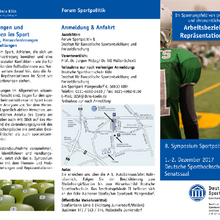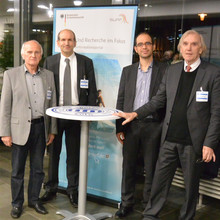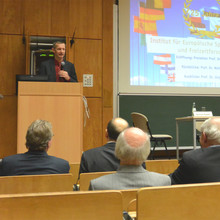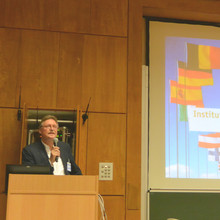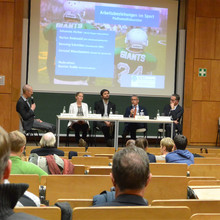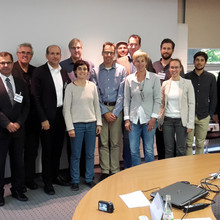Past conferences
2024
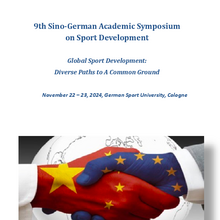
9th Symposium, 22-23.11.2024, GSU Cologne
The 9th Sino-German Academic Symposium on Sport Development Concludes Successfully
From November 22 to 23, 2024, the 9th Sino-German Academic Symposium on Sport Development was successfully held at the German Sport University Cologne. The forum attracted numerous scholars and industry experts from both China and Germany. Co-hosted by the German Sport University Cologne, Beijing Sport University, and the Chinese Society of Sports Science, the event was organized by the Institute of European Sport Development and Leisure Studies at the German Sport University Cologne and the Euro-China Sport Development Association e.V.
2024 is undoubtedly a landmark year for global sports, featuring the 2024 UEFA European Championship, the Paris Olympics, and the preparations for the 2025 Rhine-Ruhr Summer Universiade. These events not only capture global attention with their thrilling competitions but also spark in-depth discussions about event legacies and their long-term societal impacts.
Against this backdrop, the 5th Annual Eurasian Sport Industry Conference was held on November 18 at Emlyon Business School’s Paris campus, laying a foundation for academic exchange and sports industry collaboration. Following closely, the 9th Sino-German Academic Symposium themed “Global Sport Development: Diverse Pathways to Common Goals” focused on pressing topics such as:
- Legacies of recent Summer and Winter Olympics
- Legacies of mega-sporting events
- Applications of media and artificial intelligence in sports
- Promotion of sports participation and active lifestyles
- Key challenges in sports development and the Olympic Movement
The forum explored global sports development’s current trends while envisioning strategic international sports cooperation and sustainable development. As a vital platform for Sino-German academic dialogue, the event emphasized sports as a cultural bridge and offered valuable insights into managing event legacies and their social impacts.
Grand Opening: Collaborative Academic Exchange
The opening ceremony on November 22 was chaired by Mr. Yan Shang, Executive Vice President of the Euro-China Sport Development Association. Professors Jürgen Mittag from the German Sport University Cologne and Shengxin Li from Beijing Sport University, alongside Mr. Rui Jin, President of the Euro-China Sport Development Association, delivered warm welcome speeches on behalf of the hosts and organizers.
Panel Highlights
Panel I: The Legacy of Recent Olympic Games
- Professor Baoli Sun from Beijing Sport University shared her insights on the sustainable governance of the Beijing 2022 Winter Olympics, emphasizing the event’s tangible and intangible legacies, such as promoting winter sports and fostering social progress.
- Professor Jürgen Mittag analyzed the 2024 Paris Olympics, highlighting its innovations in venue reuse, sustainability, and social impacts, despite challenges like budget overruns.
- João Moretti from the Federal University of Paraná in Brazil examined the Rio 2016 Olympics, focusing on its legislative advancements and policy impacts on Brazil’s sports development.
Panel II: The Legacy of Mega-Sporting Events
- Professor Shengxin Li explored the evolution of Olympic sports and their influence on China’s sports industry, emphasizing a strategic balance between traditional strengths and emerging disciplines.
- Niklas Hack reflected on the Duisburg 1989 Universiade’s long-term impacts on regional sports and society.
- Professor Zeqiang Jie from Shenyang Sport University presented research on maximizing the public value of mega-sporting events through collaboration and innovative management.
Panel III: Media and Artificial Intelligence in Sports
- Dr. Joerg-Uwe Nieland and Dr. Alexis von Mirbach presented their study on sports media and women’s football, emphasizing media’s role in gender equality.
- Professor Daniel Nölleke discussed the transformation of sports journalism in the digital age.
- Dr. Renzhi Liu detailed AI’s applications in the Paris Olympics, such as dynamic data analysis, enhancing training strategies, and optimizing audience engagement.
Panel IV: Sports Participation and Active Lifestyles
- Professor Mingyi Liu from Wuhan Sport University advocated for integrating youth sports into education to address global participation gaps.
- Dr. Till Müller-Schoell presented strategies for increasing sports participation among marginalized groups through innovative practices.
- Dr. Jing Liu analyzed the social benefits of sports participation, highlighting its role in building social networks and promoting inclusivity.
Panel V: Key Challenges in Sport Development and the Olympic Movement
- Maximilian Seltmann explored elite athletes’ labor relations, advocating for better social security policies.
- Professor Zhaohong Wang from Beijing Normal University discussed the post-Olympics development of China’s ice and snow industries.
- Professor Kai Shao examined the role of sports events in urban integration, emphasizing their potential to drive sustainable development.
Cultural and Academic Exchange: A Dual Experience
Beyond the academic sessions, attendees visited two cultural landmarks: the Engels-Haus in Wuppertal and the German Sport & Olympia Museum in Cologne. These visits enriched participants’ understanding of Germany’s cultural and sports history, highlighting the interplay between historical legacy and modern sports.
A Promising Future for Sino-German Sports Collaboration
The forum concluded on November 23 with closing remarks from Professor Jürgen Mittag and Professor Shengxin Li, who emphasized the forum’s success in fostering meaningful dialogue and international collaboration. The event set a benchmark for future academic exchanges and partnerships in global sports development.
The 9th Sino-German Academic Symposium on Sport Development laid the foundation for a new chapter in Sino-German cooperation and provided a model for multilateral academic exchange in sports.
New Approaches to International Sport Politics? The United Nations and UNESCO as Players
Date: 18 June 2024, 11.30 - 15.30 pm
Venue: German Sport University, Cologne, Building II, Senator Room (ground floor)
Programme:Agenda
International sport politics usually has a focus on the IOC and the international sports federations, which are generally responsible for the organization and development of their respective sports worldwide. By contrast, transnational or international organizations are among the actors in international sports policy that have received little attention to date. This neglect of state actors at international level can be explained by the dominant role of international sports organizations, but also by the limited readiness of (European) countries to become more involved in international sports policy and to engage in more comprehensive networking.
The UN system has a special position at international level, in which state actors have at least occasionally or selectively been involved in sports policy. As a relevant UN actor in the fields of education, science and culture, UNESCO has been involved in sport policy issues since 1978 through its Intergovernmental Committee for Physical Education and Sport (CIGEPS). The most visible format of this activity is the International Conference of Ministers and Senior Officials responsible for Physical Education and Sport (MINEPS), which last took place in Baku, Azerbaijan, in 2023. The document adopted there, the "Fit for Life Alliance", is primarily of an encouraging nature and does not establish internationally binding regulations. The most recent MINEPS VII conference in particular documents the weak response to such activities: In Germany, there was only a very limited media response to MINEPS VII and there was also generally only limited interest from European countries in becoming more involved into the recent UNESCO activities.
Against the backdrop of these developments, the symposium, organized jointly with the German Commission for UNESCO, will shed light on the extent to which German sports policy is prepared to get involved in UNESCO activities and thus assume responsibility in terms of international sports policy. These and other questions will be discussed with experts and representatives from politics, the DOSB and GIZ.
In a second part of the event, the objectives and work program of the new UNESCO Co-Chair established at the Institute for European Sport Development and Leisure Studies will be presented. The UNESCO Chair entitled "Sport for Development, Peace and Environment in a Multidisciplinary and Global Perspective" has been established at the University of Montreal (UQAM) (Chairholder: Prof. Dr. Tegwen Gadais), with Dr. Karen Petry acting as Co-Chair. The other participating researchers from the Czech Republic (Prof. Simona Safarikova) and Brazil (Prof. Billy Graeff) will jointly present the work program for the next four years.
The symposium has the character of an expert workshop; participation is only possible for a small group of people after confirmation of registration.
Please register via email.
Deadline of registration: 12 June 2024
Registration email:iesf@dshs-koeln.de
Contact
email: iesf@dshs-koeln.de - phone: +49 221 4982-2410
Institute of European Sport Development and Leisure Studies
Am Sportpark Müngersdorf 6
50933 Cologne, Germany
Responsibles
Dr. Karen Petry, Prof. Dr. Jürgen Mittag (IESF)
Dr. Roman Luckscheiter, Dr. Lutz Möller (Deutsche UNESCO Kommission)
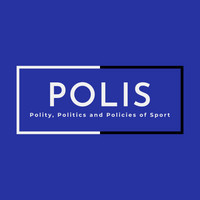

Polity, Politics and Policy of Sport - Picking up where we left off
POLIS was founded by initiative of Jeroen Scheerder (KU Leuven) and Jürgen Mittag (GSU Cologne) in 2017. The Network aims at a closer cooperation of academics who work in the field of sport politics or who deal with political issues related to sport. After a 1st workshop in Cologne in 2017, followed by several meetings at EASS conferences, workshops in Papendal, Utrecht and Cologne, we want to pick up where we left off in 2024: Renew and deepen our discussions on polity, politics and policies in the field of sport. The workshop will offer the opportunity to present ongoing research, discuss new ideas about collaborative research and identify topics and agendas.


Good Practice for Active Lifestyles in Local Sports Policies
Governing the integration of marginalized groups in sports
Kick-Off on 15th of Februar 2024
Senatssaal, Institutsgebäude II, Deutsche Sporthochschule Köln
Background to the project are the well-documented deficits of existing sport policies with regards to sports for all and sports participation. The mainstream of existing sports policies within the European model of organised sport is rather successful in activating the affluent, healthy, young, non-migrant, male members of society, but they struggle in catering to the less affluent, physically impaired, older, migrant or non-male members of society to varying degrees. Key to an improvement of this situation is a better understanding of the creation and implementation of policies that aim at usually less organised segments of society. The proposed project’s goal is to identify and analyse successful local sport policies for enhanced sport participation. This means projects and programs at the local level particularly oriented towards enhanced integration and participation of usually less organized, marginalized segments of society into the practice and the governance of sports. The project is intended to improve participation in sports for those segments of society that are usually underrepresented or excluded. By identifying and understanding good practice for the integration, inclusion and participation of all segments of society, in particular the marginalised, the aim is to better understand and popularize procedural, institutional dimensions of such policies and programs. The project assumes that the local level, cities and municipalities are the focal point for improvement as they are practically involved with sports for all. It is here that new and innovative approaches can be developed and it is the very locus of participation in a tangible sense. By combining good practice, institutional change and the analysis of local networks, the project seeks to highlight new and successful ways in process and content of local sport politics and governance.
2023
On June 29 and 30, the Institute of European Sport Development and Leisure Studies hosted the second project meeting of the SDE Pro Sports Project. The project partners—the IESF, the European Association of Sport Employers (EASE) and the European Elite Athletes Association (EU Athletes)—were joined by representatives from players’ unions and sport employers from an assortment of sports and countries. The diverse composition of the project meeting attendees led to valuable exchanges about social dialogue in professional sports in Europe.
The interim project outcome, in the form of a database of social dialogue outcomes, can be accessed here: https://www.easesport.eu/main-outcomes-of-social-dialogue-in-professional-sports/
For a more in-depth recap of the project meeting, check out the report on EASE’s website: https://www.easesport.eu/the-sdeps-consortium-gathered-in-cologne/
On June 21, 2023, eleven stakeholders from the German sports landscape met at the German Sport University Cologne for the first of the SOPROS project’s National Workshops. The goal of the National Workshop was twofold: first, to facilitate an exchange of ideas and opinions of the participants regarding the social protection situations of German elite athletes in Olympic sports; and second, to introduce the participants to the Self-Assessment Tools developed as part of the project, and get feedback and comments about the Tools. The workshop group included representatives from the German Federal Military (Bundeswehr), the German Olympic Sports Confederation (DOSB), TSV Bayer 04 Leverkusen, Athletes Germany (Athleten Deutschland), the Federal State of North Rhine-Westphalia (Staatskanzlei NRW), Olympic Training Center Cologne (OSP Köln), Freiburger Kreis, and the North Rhine Athletics Association (Leichtathletik-Verband Nordrhein).
The workshop participants were first introduced to the structure and timeline of the SOPROS project, and made familiar with its goal of assessing athletes’ social protection coverage to identify potential gaps and come up with potential policy recommendations. Next came a lively discussion regarding what types of activities in the field of social protection their organization is currently carrying out, how they estimate the current social protection measures for elite athletes in Olympic sports in Germany and which concrete needs they see, and what types of debates are being held surrounding the topic.
After a short coffee break, the workshop participants were introduced to the Self-Assessment Tools—one Tool for athletes, and one Tool for stakeholders—and walked through the overall concept as well as the back-end design of each Tool. The three components—athletes’ entitlement to statutory and athlete-specific social protection measures, the provision of athlete-specific measures, and athletes’ perception of the level of social protection—were detailed at length. In a second discussion round, participants were asked for their feedback and comments regarding the potential value of the Tools and their intended output, as well as possible challenges regarding the creation and implementation of the Tools.
Both discussion rounds generated valuable information regarding the current challenges and future opportunities in the area of social protection for elite athletes in Olympic sports. Feedback received from the diverse group of stakeholders will undoubtably provide an excellent basis for the next steps of the SOPROS project.
2022
Details
Report of the Event
Organised by the Institute of European Sport Development and Leisure Studies at the German Sport University of Cologne and supported as partner university by the Beijing Sport University the 7th Sino-German International Forum on Sport Development was held online on December 16th, 2022. During the Forum 2022, eleven distinguished experts representing institutions such as Beijing Sport University, Central China Normal University, Chengdu Sport University, German Sport University of Cologne, Johannes Gutenberg University Mainz, Southwest Jiaotong University, and Rhine-Ruhr 2025 FISU Games GmbH, engaged in academic discussion and exchanges on the topic ‘The Many Faces of Sport and Major Sporting Events: Governance, Infrastructure, Controversies and Legacies’. In the course of the event the forum attracted an online audience of around 100 participants who discussed the topic with the experts from both China and Germany.
During the Introduction session, the Head of the Institute of European Sport Development and Leisure Studies at the German Sport University of Cologne, Univ.-Prof. Dr. Jürgen Mittag firstly provided the background of the forum 2022. As he said, the Institute of European Sport Development and Leisure Studies has been organising international academic forums since a decade with the intention of further deepening academic collaboration and research. He hereby calls for active participation of further Chinese universities, while continuing the previous tradition of periodic forums to form a ‘once-a-year, one-German and one-China’ format.
In his opening remarks, Univ.-Prof. Dr. Christoph Breuer, the Vice-President of the German Sport University of Cologne, the Head of the Institute of Sport Management, welcomed warmly the guests. Firstly, he acknowledged the efforts of the Institute in organising this kind of international academic forum since 2012 and underlined the impact of international exchange. Moreover, he emphasized that the year of 2022 is quite special, as it coincides with the 75th anniversary of the founding of the German Sport University of Cologne and the 70th anniversary of Beijing Sport University (in 2023). The 41-year history of inter-university cooperation has witnessed many fruitful collaborations, and he also hoped to continue and deepen meaningful cooperation with Chinese partners. He re-emphasised that sport should be an important bridge to enhance mutual understanding, even when challenged by epidemics and international relations. Finally, he wished the Forum 2022 a success and looked forward to a return visit in 2023 for the anniversary of Beijing Sport University.
The Forum 2022 featured three key-topics, including ‘the role of universities (GSU and BSU) in research on sport development”, ‘European and Chinese Perspective on Sport Mega Events’, and ‘The Future of Sport Mega Events’.
Univ.-Prof. Dr. Stephan Wassong, member of the IOC Olympic Education Committee and the Head of the Institute of Sport History at the German Sport University of Cologne, combed through the history of the development of the German Sport University of Cologne. He showed in detail the development process of the university from an academy for teachers to a university and introduced some milestones as well as key information about the institutional set-up. As his counterpart, Prof. Dr. Shengxin Li, the Vice Dean of the School of Management at Beijing Sport University, also sorted out the history of the development of the Beijing Sport University and focused on its role in the development of competitive sports in China.
After the session on the history of the two universities, the 2022-Forum addressed the topic of mega events. During this session, four experts discussed the topic of sport mega events from the Chinese and German perspectives respectively. Dr. Christian Alfs, Senior Lecturer at Johannes Gutenberg University Mainz, discussed the controversial matters of human rights and labour issues as well as the post-match stadium utilisation for the Qatar World Cup from the three dimensions of sustainability, namely the economic, social, and ecological dimensions. He argued that the labour question in Qatar is not as critical as it is often stated in online-sources; most of the workers are satisfied in general. Moreover, he pointed out that Qatar needs to think seriously about the post-match utilisation of the stadiums and venues, as the distribution of them in Qatar is too concentrated that it is difficult to gather popularity and achieve the sustainable goal of post-match utilisation with only the local league afterwards instead of an international or mega event. Dr. Di Wu, lecturer at the School of Management at Beijing Sport University, gave an overview on the the legacies of the Beijing Winter Olympics, focusing on how Beijing Winter Olympic legacy promotes the high-quality development of public service systems for national fitness in Beijing. The author first introduced the effectiveness and achievements of the construction of the public service system for national fitness, and then she further explained the mechanism of transferring both material and spiritual legacies in the Beijing Winter Olympics into a high-quality public service system for national fitness. She emphasized in her report that material legacies, such as venue, infrastructure, and talent legacies, as well as those spiritual legacies, namely culture, education and volunteer spirit legacies are important part of the Beijing Winter Olympics, and these legacies work through facilities, fitness instruction, training and completions, sport information, physical fitness monitoring, and other aspects for the development of national fitness.
After a discussion of these two major sporting events of the year 2022, the Head of the Institute of European Sport Development and Leisure Studies at the German Sport University of Cologne, Univ.-Prof. Dr. Jürgen Mittag put his focus on the political reflections on sport mega events. Based on an overview on the autonomy and neutrality of sport, he delved into the evolution of their connotations throughout the history of the Olympic Movement, which offered references to the discussion on sport diplomacy. Mittag referred to the concept of ‘soft power’ by Joseph Nye and showed the audience several case studies from history. Finally, he introduced a quadripartite framework for investigating ‘new’ sport diplomacy and raised the awareness on the positive use of sport in diplomacy and politics. Backing to the sport mega event itself and its stadiums and venues, professor at the School of Physical Education at the Central China Normal University, Prof. Dr. Yuanxin Chen discussed the post-match utilisation of the football stadiums after the Asian Cup. After introducing basic information of the ten venues in terms of investment pattern, costs, number of clubs and seating capacities respectively, he highlighted two multifunctional venues with ingenious designs, namely Chongqing Longxing Stadium and Xiamen Egret Stadium. He listed four main utilisation modes of those stadiums after, including serving to professional sports clubs, fitting into the sport industry development, integrating with national fitness system and demolishing after the game. He also recognised several challenges that will be faced in utilizing those venues after the games, such as transportation, operation, and management issues.
The third panel of the conference addressed the highly salient issue of the future of sport mega events. On the beginning, Dr. Till Müller-Schoell, Senior Research Associate of the Institute of European Sport Development and Leisure Studies at the German Sport University of Cologne, focused on “strategic approaches to sport mega events from a German perspective. He stressed the relevance of new objectives for the planning and the assessment of mega sporting events’ success. Building on the widespread criticism within German society with regards to hosting MSEs an analysis of legacy and sustainability became inevitable. As a result, the federal government has developed a strategic approach to MSEs that shifts the attention away from mere international image or economic viability towards social and ecological ambitions. Conceptions for upcoming MSEs and bids to host MSEs already reflect this shift and underscore it as a precondition for public acceptance or even support. Prof. Dr. Jiang Liu, the Head of the School of Physical Education at the Southwest Jiaotong University, dedicated his talk to the topic of building Chengdu into a world-famous city of sport events. According to his observations, Chengdu has hosted many mega sporting events in recent years, and these events have been integrated to form the necessary conditions for building a “world-famous city of sport events”. He emphasised that the goal of building a world-famous events city is divided into three steps. By 2025, a world-class event system will be basically formed, and sports events will become a ’new business card’ of Chengdu. By 2030, a high-quality development in all areas and in all aspects can be seen. And by 2035, a new image of ‘park city under the snowy mountains’ will be presented, and sport will become a bridge between the city of Chengdu and the world. Later on, Yaqian Zheng, senior manager of Rhein-Ruhr 2025 FISU Games, turned her foci on this event in 2025. As the world’s largest sporting event after the Olympic and Paralympic Games, this specific event will be hosted from 16th to 27th July 2025 in Germany’s Rhine-Ruhr area. The speaker explained the concepts of the venue, accommodation, and transportation in view of sustainability. And she showed the way of transforming the area from a primarily industrial world to a knowledge society through the event. Corresponding to the University Games war the presentation from Fei Yang, Associate Professor, and the Deputy Director of the International Office at Chengdu Sport University. In the meantime, working as the Director of Training Service Division at Sport Competition Department of the Chengdu FISU Games Executive Committee, he sorted out the organisational structure of the event in detail and showed the practical challenges during the event’s preparation and organisation.
Last but not least, the final speech was delivered by Dr (des) Lena Hemker on “trend sports”. She first analysed the development of sport today from three different dimensions, namely history, society and economy, and proposed the concept of sport universe which includes both traditional sports and alternative sports. Later on, she analysed the players linked to alternative or trend sports by events and proposed that events can be worked on the development of alternative sports in all three dimensions.
The panel discussion after the speeches deepened some particular aspects or issues left before. Moreover, questions from the online audience have also been answered. Both experts believed that ‘a common language’ can be spoken when it comes to mega sporting events and the East and West should reject controversies and learn from each other to depend on the sustainable development of mega sporting events in the future.
The Forum 2022 was coordinated by Univ.-Prof. Dr Jürgen Mittag, the Head of the Institute of European Sport Development and Leisure Studies at the German Sport University of Cologne and Danlin Wu, Assistant Researcher of the Institute of European Sport Development and Leisure Studies at the German Sport University of Cologne. From China, Prof. Dr Shengxin Li, the Vice Dean of the School of Management at Beijing Sport University, contributed to the concept of this event. Danlin Wu and Xiaohu Wu served as translators of this forum.
Agenda and Scope of the Event
The Many Faces of Sport and Sport Mega Events:
Governance, Infrastructure, Controversies, and Legacies
16th December, 2022 at GSU
(online conference)
Participation via ZOOM
https://us06web.zoom.us/j/89677101075
Meeting ID: 896 7710-1075
Passcode: 123349
Download Agenda of December 16, 2022
Targets and Scope
In previous decades, Europe and China have had intensified their cooperation and exchanges in the fields of politics, economy, culture. During the past months however, the situation has become more difficult due to the political circumstances in the international relations. Against this backdrop, the Institute of European Sport Development and Leisure Studies (IESF) at German Sport University Cologne (GSU) and the Beijing Sport University (BSU) aim at continuing their long-time collaboration in the field of sport studies. Both university carry out international academic forums since 2012 that take place alternately at the two universities. With the intention of further deepening academic research and collaboration, the two partners have called for the active participation of further Chinese universities, while continuing the previous tradition of periodic forums to form a ‘once-a-year, one-German and one-China’ format.
The year of 2022 is a special year for mega sports events considering the two events - the Winter Olympics and the Football World Cup which held in the grip of the ongoing pandemic and the war in Ukraine. The Football World Cup in Qatar is still in full swing. During this eye-catching event, there are not only exciting matches that capture the attention of the audience, but also the overall political and social circumstances of sport mega events and the related legacy issues that have been widely discussed.
In order to explore these various faces of sport, the 7th Sino-German Academic Forum on Sport Development puts the focus on sport mega events and their legacies but address also the future of sport mega events. This become particular relevant as Germany will host the EURO in 2024 (the European continental championship in football), and the University Games in 2025 when considering China will also host the University Games in 2023.
In addition, coinciding with the 75th anniversary of the founding of German Sport University and the 70th anniversary of Beijing Sport University (2023), both sharing 41-years of inter-university cooperation, the forum 2022 will also reflection on this dimension in an extra session. The forum 2022 brings together both experts from the academic and practical fields of China and Germany to analyze and discuss sport mega events and their legacies.
MSE6 Final Event: 6 December 2022, Brussels
The Future of Athletes’ Employment Relations in Olympic Sports: Results and Recommendations from a Good Governance Perspective
The conference event, hosted by the European Committee of the Regions and supported by the S&D Group of the European Parliament, took place on Tuesday, 6 December 2022 in Brussels.
After the presentation of the final project report, two stakeholder panels with high-ranking decision-makers from sport and politics discussed the implications of the results and recommendations for the future of athletes' employment relations in Olympic sports.
A report of the conference can be found at the website of the European Olympic Academies.
Follow-Up of the Event on 27.10.2022
The responsibility of politics, business, federations and players?
Host: Institute for European Sport Development and Leisure Studies
Partner: Bundeszentrale für politische Bildung, DFB Kulturstiftung, Candid Foundation
See below for the audience's opinion from the survey in the form of graphs, as well as audience questions and comments written via the WebEx chat tool during the event.
Read the article about the event on the DSHS website.
- How do the panelists justify the large amount of workers that had to give their lives? Are they just collateral damage of this World Cup in an eastern Country?
- What needs to happen at FIFA (corruption) and the hosting country (human rights, no LGBTQ or women’s rights) that the DFB stands up for basic values? #fairplay
- Sind 15.000 Tote ein „kleiner Riss in der Villa“?
- How do you see the Qatar World Cup in the light of sustainability especially in a time of the energy crisis? For example cooling down the open air stadiums?
- Do the Athletes have the responsibility to boycott the tournament even though it’s maybe their only chance to play on the biggest football stage of the world?
- Wie kann es sein dass die Universität nur eine kritische Stimme gegenüber Katar eingeladen hat?
- What impact do you think it would have if a major nation like Germany announced tomorrow that it was boycotting the World Cup?
- It is absolutely unbelievable that Lemke says „they are unskilled labor“, so they don‘t deserve basic human rights??
- Protecting human rights is not Eurocentrism.
- Macht es mich zum schlechteren Menschen die WM du schauen? Gibt es Möglichkeiten von zuhause aus positiven Einfluss auf die Situation vor Ort zu nehmen?
- Was genau hat sich in Katar positiv entwickelt wenn bei der WM Vorbereitung 15000 Menschen sterben und es Sklavenarbeit gibt?
- Can you please bring in our critical comments?
- Is there a legacy plan in place for the use of the stadia infrastructure? How will the stadiums be used/maintained?
- What do you think about employers holding/confiscating passports from the workers and refuse their will to leave the country? Why trap people against their will
- An Herr Brüggmann: „Traditionen“ wie Homophobie halten sie also für Schützenswert, und verteidigen, dass der Staat Katar an diesen Festhält?
- Finally I know how the Fridays for future community feels when they discuss with boomers.
- What initiatives are there to foster womens participation in the preparation process?
- How can you state that German media coverage is misinterpreted from critical students when you live in a country without free speech?
- Wenn es für Quatar ums Image geht: Warum wurde nicht auch in Arbeitssicherheit investiert, sodass man die WM global auch viel positiver aufnehmen würde? (edited)
- In Formula One, Grand Prix in the Middle East are a normal part of the annual schedule. What characteristics are different in Football to cause such an outcry?
- Es ist kein Argument zu sagen, dass andere auch Unrecht tun und man es deshalb nicht kritisieren darf.
- You cannot raise your voice if you get inprisoned for it
- Glauben Sie, Katar hat bei der Vergabe unterschätzt, wie groß die Kritik werden würde? Oder haben die Kataris das schlicht "in Kauf genommen"?
- What are the pros and cons of the timing of the tournament (midseason) and how do you think that will affect National leagues?
- Wird es für homosexuelle Menschen während der WM sicher sein in Katar?
- I understand that Qatar is using the World Cup for soft power purposes. However, could it also be seen the other way around = west gaining influence in Qatar?
- TSG Hoffenheim ist auch 1899 gegründet worden.
- Die Menschen gehen „freiwillig“ nach Katar? Sie sterben, bekommen keinen Lohn, werden als Sklaven! gehalten
- Was für eine riesengroße Enttäuschung diese Veranstaltung. Alles wird relativiert
- Frauen werden in Katar vergewaltig und kommen dann ins Gefängnis weil sie außerehelichen Sex hatten
- FIFA is pressured to remove Iran from the World Cup. How would you comment on that?
- Welche Hoffnung haben Sie (Panel) für die Situation in Katar nach der WM? Bspw. Verbesserung der Lebensbedingungen für Minderheiten.
- Durch die Korruption der FIFA argumentieren wir überhaupt über diese WM. Glauben Sie, dass FIFA sich genügend intern verändert hat um in Zukunft "fair" zu sein?
- Herr Rettig, Sie sagten, dass die WM nicht boykottieren werden. Sehen Sie also andere in der Verantwortung Veränderung herbeizutragen als die Zuschauer zB. DFB?
- Sind sie sich darüber bewusst dass sie, indem sie die positiven Seiten von Katar hervorheben, von der PR Maschinerie benutzt werden und sportswashing betreiben?
- How can you not draw a line when so many people die for the sake of playing football???
- Ein Riss in der Wand mit 6500 Toten vergleichen?
- False Balance in der Gästewahl
- "Richtig reden über die WM" - kann der Punkt auch noch aufgemacht werden? Jetzt, da die WM stattfindet, wie sollten Medien über sie berichten?
- Welche Art von Protest-Aktionen könnten während der WM wirklich etwas bewirken für die Menschen vor Ort?
- In the discussion, the improvements and changes in Qatar are pointed out. What are the actual changes in law and society, how effective and long-term are they?
- Können wir einen Faktenfinder nebenbei bitte laufen lassen?
- Wenn eine WM in Qatar zu boykottieren sei, ist es dann folgerichtig generell autokratisch, diktatorisch, nicht demokratisch geführte Länder von WMs auszuschließen
- @Engel: Warum stellen sie es so dar, als wäre Katar als Austragungsort ein "sozialer" Auftrag der FIFA gewesen? Bei der Wahl wurde doch faktisch bestochen?
- In Katar spielt Geld keine Rolle. Müsste das Land unter den Bedingungen nicht schon viel weiter sein in Sachen Menschenrechte?
- Wie optimistisch sind Sie, dass der angegangene Reformweg auch nach der WM fortgeführt wird, wenn das mediale Flutlicht weg ist?
- Für mich steht gegenüber der angegangene Reformen einfach diese große Zahl an töten Gastarbeitern. Warum wird darüber nicht gesprochen?
- How as a fan i can defend LGBT? While the Qatar has law that put people in prison for any act or defending LGBT?
- 15,000 people DIED because of this world cup. How can you defend it and look yourself in the mirror? Do human lives not matter? (edited)
- Es wurde auch in Russland kritisch berichtet. Das Argument mit der Doppelmoral ist absolut zynisch und zeugt von Whataboutism. Die Zeiten ändern sich eben.
- Gastarbeiter sterben bei Bau von WM Stadion. Stadien in Katar sind klimatisiert und bieten klasse Bedingungen. Stellen Sie sich die Nachrichten so vor?
- The blood world cup
- Es ist kein „Draufgehaue“ wenn man Missstände kritisiert
- Herr Kettner, verstehe ich richtig dass für Sie Medien hauptsächlich auf Klicks arbeiten sollen? Was wäre denn Journalismus ohne ausführliche Berichterstattung?
- What does it take to satisfy a sponsor like Budweiser regarding Qatar's alcohol policy?
- In how far can the public discourse about the FIFA World Cup lead to an increase in general political interest in the German society?
- Ist es an der Zeit, dass sich die FIFA stärker politisch positioniert (z.B. Gender Equality) bzw. sollten gewisse Werte Voraussetzungen einer Vergabe sein?
- What do you think about the constant media bashing that refuses to die down? Would you attribute the changes in Qatar to this media scrutiny?
- Fakten: Die Bedingungen haben sich de facto nicht nachhaltig zum positiven verändert. Das haben Investigationen ganz klar offen gelegt.
- Warum wird über die Wm in Katar so viel berichtet? In Russland/Brasilien gab es auch massive Menschenrechtsverletzungen,da wurde nicht mal halb so viel berichtet
- Wie können wir sicher sein, dass sich Dinge in Katar nach der WM weiterhin positiv entwickeln werden?
- Katar geht mit Kritik so um, dass sie Menschen mundtot machen und Gegenstimmen ins Gefängnis kommen.
Extraxt out of Charlotta Lysa's publication: Qatari Female Footballers, in: Danyel Reiche (ed.): Sport, Politics and Society in the Middle East
"…Over the past decade, Qatar has invested enormously in national and international sports development, partly explained by the bid for the 2022 World Cup, which demands a certain commitment to the sport. These investments include efforts to develop women's sports, although these investments are limited compared to men’s athletic activities. The Qatar Women’s Sports Committee (QWSC) was set up in 2001 by royal decree, and has since worked on creating awareness and improving conditions for women in sports. The QWSC helps to facilitate female athletes and develop women’s sports along the relevant national sports federations. Qatar’s first women’s national football team was set up in 2010. Despite these efforts however, women’s football is still a neglected part of the Qatari sports evolution. In 2012, Kelly Knez et al. interviewed five players from Qatar’s first female football team, arguing that the World Cup has already been a catalyst for change in the field of women’s sports, but that cultural factors make it harder for women to participate, thus demanding serious negotiations between the play-…”
2021
EMPLOYS MSE2: December 17, 2021, Lisbon
6th Sino-German Academic Forum on Sport Development, December 21st, 2021
Sport Mega Events and Sustainability – The Winter Olympics
- 21. December 2021 CET 8:00-12:00 (CST 15:00-19:00)
On 4 February 2022, the opening ceremony for the 2022 Olympic Winter Games will take place at the Bird's Nest National Stadium in Beijing. Athletes will compete in a total of 109 events in seven sports and 15 disciplines. One month later, on 4 March 2022, Beijing will welcome around 600 Paralympic athletes to the 2022 Paralympic Winter Games. Beijing will thus be the first city to host both the Summer and Winter Paralympic Games. Both the Olympic and Paralympic Games are met with high expectations, but also considerable challenges. China wants to use the 2022 Games to further underpin the country's continued growing global influence. As the country is not a classic winter sports nation, it has invested considerable resources in athletes and sports facilities. The sports facilities in Zhangjiakou and in Yanqing in Hebei province had to be rebuilt and connected to the high-speed rail network. At the same time, the ongoing pandemic makes increased security precautions necessary.
These general conditions provided the background for the 6th Sino-German International Academic Forum on Sport Development, which was jointly organized by Beijing Sport University and German Sport University Cologne as an online event on 21 December 2021. Key aspects of mega sporting events were presented and discussed in a total of six expert talks and a panel discussion. Special attention was paid to the issue of sustainability. In May 2020, the Beijing Organizing Committee for the 2022 Olympic and Paralympic Winter Games (Beijing 2022) released the official 'Beijing 2022 Olympic and Paralympic Winter Games Sustainability Plan', which promotes Beijing 2022's vision of 'Sustainability for the Future' and reaffirms China's adherence to the 'sustainable development' strategy. From a transnational perspective, the conference focused on the goals, preparations and potential effects of this major sporting event.
EU Sports Policy: Assessment and Possible Ways forward" Committee Meeting (22.06.2021)
With the entry into force of the Lisbon Treaty in 2009, sport was anchored in the EU Treaties as a matter of primary law. Although sport policy still remains primarily in the hands of the individual EU member states, the last decade has seen an increasing number of European initiatives in the field of sport. On the one hand, these have come from the Member States and from organised sport itself. On the other hand, initiatives have also come from the EU institutions, as sport not only overlaps with many areas of EU legislation - such as the common market - but is also increasingly understood in terms of its social and societal function.
With the aim of analysing the development to date, the current situation and potentials for the future of European sports policy, IESF prepared a study for the European Parliament as part of the project "EU Sports policy: Assessment and Possible Ways forward", which takes a closer look at development lines, structures and policy areas of European sports policy. The study was presented to the CULT Committee of the European Parliament in June 2021 and is now available online and in print: https://bit.ly/3cwK44r
International symposium on anti-doping governance (18.-19.05.2021)
The presentation of the key results of the National Anti-Doping Governance Observer project, that was originally scheduled for November 2020 in Bonn and postponed due to the ongoing Covid-19 pandemic, was held at an online symposium organised by NADA Germany, iNADO and Play the Game on 18 and 19 May 2021.
The final scores of the participating NADOs for the developed principles and indicators of good governance as well as key issues and practical implications aimed at enhancing the quality of anti-doping governance were presented and discussed.
Apart from the presentation of the key results of the research project, the symposium featured a number of well-known experts from the world of anti-doping and athlete representation, including Richard McLaren, known for his critical role in investigating the Russian doping scandal, and Rob Koehler, Director General of ‘Global Athlete’. Issues of independence in the anti-doping work, WADA governance reforms, and the role of athletes in creating anti-doping policy were major points of discussion.
The National Anti-Doping Governance Observer (NADGO), a comprehensive set of indicators of good governance in anti-doping organisations that operate at the national or sub-national level, can be downloaded on Play the Game's website.
National Anti-Doping Governance Observer: indicators and instructions for assessing good governance in national anti-doping organisations.
The aggregated final project report, including methodology, country reports, scores of the participating NADOs as well as overall conclusions and recommendations for action can be found here:
bit.ly/3zJ1nbS
2020
Annual conference of the specialist group "Media Sports and Sports Communication" (23rd - 25th September 2020)
House of the History of the Ruhr, Bochum.
The conference, organized by Prof. Jürgen Mittag (German Sport University Cologne) and Dr. Jörg-Uwe Nieland (Zeppelin University Friedrichshafen), took place as a hybrid event. The event was streamed live in its entirety; the organizers, the spokesperson for the specialist group "Media Sports and Sports Communication" in the German Society for Journalism and Communication Studies (DGPuK) JProf. Dr. Christiana Schallhorn (Johannes Gutenberg University Mainz) and the junior spokesperson for the specialist group Dr. Philip Sinner (Paris Lodron University Salzburg) as well as some of the speakers attended the conference in attendance; a total of 15 people visited the conference room in the Haus der Geschichte des Ruhrgebiets. Unfortunately, hygiene regulations did not allow for a larger (presence) round.
The pandemic-related circumstances posed a major organizational challenge, because in addition to the technical components, the interaction of "digital" and "present" participants was not possible as usual. Nevertheless, it was possible to put together a diverse and thematically wide-ranging program.
For example, for the first time a young talent workshop was held under the direction of Philip Sinner, Jörg-Uwe Nieland and Jürgen Mittag. In addition to five final theses by Bachelor's and Master's students, two dissertation projects were presented and discussed. The workshop served as an exchange of experiences for the young researchers, as support for specific questions regarding the respective theses, and as a networking opportunity for future collaboration.
Jörg-Uwe Nieland and Jürgen Mittag kicked off the conference with a presentation on "Media Sports and Sports Policy: Taking Stock of New Challenges. This was followed by the first of a total of seven panels, which were devoted over two days to the topics of "Sport, Communication and Politics" (Panel 1), "Medialization and Mediatization" (Panel 2), "Journalism - Achievements and Deficits" (Panel 3), "Current Expressions of Media Sport" (Panel 4), "Sports Communication in Research and Teaching" (Panel 5), "Major Sports Events: A Review" (Panel 6) and "Research Subject: Football Documentaries" (Panel 7). In total, there were 19 presentations. The keynote address was given by Axel Schäfer, an SPD member of the German Bundestag since 2002, on "COVID-19 and the impact on elite and popular sports." Schäfer addressed the difficulties faced by organized sports during the COVID-19 pandemic. Examples included the payment of employees and exercise instructors, the closure of training facilities, and financial losses due to missing sporting events. These problems became visible in the cancellations or postponements of major sporting events - especially the 2020 European Football Championships or the 2020 Summer Olympics in Tokyo, Japan - and the changes to the match/competition schedules of both professional and amateur sports.
The event concluded with the workshop "Sports Communication Research during the COVID-19 Pandemic." A wide range of research activities were presented and debated in five short presentations. Among them was the ongoing study by the project group "Covid-19, Communication and Media, Clubs (CoKoMeV)" (led by Prof. Seeger (Stuttgart Media University), which used a quantitative online survey to examine the communication behavior and media use of sports clubs during the lockdown phases caused by COVID-19. For this and other research activities and findings, the "Corona Blog" of the online Journal of Sports Communication and Media Sports (https://openjournals.hs-hannover.de/jskms/) serves.
The meeting demonstrated the opportunities and need for greater intertwining of research efforts on sports policy and sports communication. The preoccupations with the impact of the Covid 19 pandemic, such as those found on the aforementioned blog, among others, provide a platform to do so.
POLIS network workshop (February 6th - 7th, 2020)
“Good Governance in Local Sport? Comparing Changing Sport Settings in European Cities and Municipalities”
Title:
Polity, Politics and Policies of Sport at the local level: Comparing European cities and municipalities
Responsible:
Jürgen Mittag (Institute of European Sport Development and Leisure Studies, German Sport University Cologne
Organisation:
Till Müller‐Schoell ((Institute of European Sport Development and Leisure Studies, German Sport University Cologne)
Kevin Nothnagel (Institute of European Sport Development and Leisure Studies, German Sport University Cologne)
Content:
Analyses and descriptions of the politics of sport predominantly focus on the national level, where the constitutional division of power between the state, civil society and the market as well as continuous processes of interest intermediation or domination and large‐scale policy programs on elite sport, sport for all or health enhancing physical activity prevail. Yet, the actual locus of day‐today sport politics in most cases is local, oriented towards informal sport participation and towards social ends. Embedded in a variety of political and administrative networks in cities and municipalities, public private partnerships and civil society engagement, arguably the differences
between national sport systems become muddied and the within system variability much more visible. The workshop aims at a collection of facts and impressions on local level sport polities, politics and policies conducive to a comparative discussion and future collaboration within the network and in the context of an Erasmus+ grant application.
Papers and presentations:
- Sport and the National Rally: a comparative study of two municipalities’ sport policies
Guery, Valentin und Zubizaretta, Ekain (Paris‐Nanterre University. Institut des Sciences Sociales du Politique, Frankreich) - Local sports policy and frontline professionals
Hoogendam, Ad (Mulier Institute and Windesheim University of Applied Sciences, Niederlande) - From national policies to local practices: implementation of the Finnish Schools on the Move
programme
Lehtonen, Kati (LIKES Research Centre for Physical Activity and Health, Jyväskyla, Finnland) - Decentralisation of English sport policies for young people: Can coherent, sustainable and localised
emerge?
Lindsey, Iain, Durham University, Department of Sport and Exercise Sciences, Great Britain) - German local sport politics: Options for innovation and inclusion in a policy network with a semisovereign
state and quasi‐corporatist intermediation
Müller‐Schoell, Till (German Sport University Cologne) - Local Sport Politics in Hungary
Perényi, Szilvia (University of Physical Education, Budapest, Department of Sports Management, Hungary) - Comparing local sport politics: Methods and Data, Approaches, Feasibility, Comparability (working
title)
Pulles, Ine (Mulier Institute, Utrecht, Netherlands) - The relation between central/regional sport administration and local sport authorities from a
Principal‐Agent or co‐governance perspective. The Belgian case. (working title)
Scheerder, Jeroen (University of Leuven, Department of Movement Sciences, Belgium) - City councils and sport in Barcelona province
Solanas, Judith (Institut Nacional d’Educació Física de Catalunya, Spain)
Co‐authors: Judit Viaña, Anna Vilanova - Local sport policy in Norway
Solenes, Oskar (Molde University College, Norway) - Expectations and value behind supporting professional team sports organisations at a local level in
Poland
Zembura, Paweł (University of Warsaw, Poland)
10th Symposium of Sport Politics: "Sports Metropolis" Ruhr in NRW? (January 23-25, 2020)
Development lines of sport in the Ruhr Area
On the way to becoming the "Sports Metropolis" Ruhr in NRW?
Development lines of sport in the Ruhr Area
Date: 23-25 January 2020
Place: House of the History of the Ruhr Area, Clemensstraße 17-19, Bochum
Responsible: Prof. Dr. Jürgen Mittag IESF
PD Dr. Christoph Seidel Foundation History of the Ruhr
Prof. Dr. Walfried König Speaker Forum Sport Policy
Background: The debate surrounding the bid of "Rhein Ruhr City 2032" to host the Olympic Games in 2032 is currently leading to intensified debates about the significance of sport in the Ruhr region and in NRW. In this context, the focus is not only on the approval of the population to host a sports mega-event such as the Olympic Games, but also on the question of the roots and the development lines of sport in the Rhine and Ruhr region.
In particular, the Ruhr area is considered one of the most important soccer centers in the world. However, the strong presence of soccer obscures the broad view of the sports landscape of the Ruhr and NRW and contributes to the fact that the region's diverse sports history has almost been forgotten. Whether six-day races or boxing competitions, whether the Ruhrolympics or World Games, whether Olympic champions or world champions: numerous competitions, events and people from the region's sporting history have now fallen into oblivion. This applies not least to numerous clubs and sports facilities.
With the aim of shedding light on fundamental stages of sports development in the Ruhr and North Rhine-Westphalia regions, the symposium will address seven central problem areas of regional sports development. In addition to individual time stages, the focus is also on sports actors, sports disciplines, sports facilities, major sports events and sports personalities and socio-political interactions.
The event was financially supported by Evonik Industries AG.
2019
Title: Sino-European Perspectives on Urban Sport and Health Development
Date: 19th / 20th December 2019
Venue: senate hall, German Sport University Cologne
Backdrop:
In the last two decades, the mutual interest in the development of politics, economy and culture in China and Europe has increased. The growing awareness for changes in Asian and Europe has not only fostered communication and academic exchange in general, but also increased transnational research in the field of sports.
Over the past years, the Institute of European Sport Development and Leisure Studies at German Sport University Cologne has hosted a series of conferences that addressed and discussed various topics relating to sport development in China and Europe from a transnational perspective. Topics covered so far have included sports structures, institutions, associations, changes in football as well as other sports, and major sporting events. The Cologne conferences had their counterpart in corresponding events in China, namely at Beijing Sport University.
The 2019 symposium is taking place again in Cologne. The key issue of this event is dedicated to health and urban development. Since the announcement of the Agenda “Health China 2030” by the State Council of the Chinese Government in October 2016, the topic sport and rehabilitation and related issues such as sport and prevention or sport and healthcare are moving to the forefront of Chinese sports studies. Since academics in Europe and Germany are also working in this field for a long time, an intense exchange on the current status of research, on existing studies and on further activities is highly appreciated. This is all the more true as the trend towards urbanization continues and cities are more than ever perceived as catalysts of social development.
Against this backdrop, an examination of transnational and comparative developments in these fields is at the Centre of interest. Based on previous exchange and research collaboration, the 2019 symposium will focus both on sports development in general and on the issue of sport and health in particular. The conference is planned as a further step in the cooperation between German and Chinese sports studies. Academics from both countries and different universities are invited to contribute to the conference.
Main topics:
- Current state and prospects of German/European and Chinese sports development
- State and prospects of German/European and Chinese health development in view of sports aspects
- The role of sport in urban settings
- Healthy China 2030 and sports
- The Role of non-state stakeholders (Clubs, leagues, associations)
- School sports and University Sports in view of Healthy China 2030
- Education and research in sport in China
Specific topics:
- Case studies on specific metropolises, municipalities, regions, and programs in China and Germany
Title: MSE "Promoting and Supporting Good Governance in the European Football Agents Industry"
Date: 1.2.2019
Place: Senatssaal, Deutsche Sporthochschule Köln
After fruitful events in London and Madrid, the Cologne meeting will reflect the ongoing endeavors on player agents’ regulation and analyse the reform perspectives of the FIFA Task Force Transfer System.
The thematic focus of this third MSE will be placed on “Professional Standards, Licensing and Qualification”. This topic has caused much debate in the past and, so, we are much looking forward to presenting results of our research and discussing the future of player agents’ regulation with you.
This event is part of the ERASMUS+ research project carried out across member states of the European Union. The project is led by Edge Hill University (represented by Professor Richard Parrish) and the project partners are the Universidad Carlos III Madrid, the University of Umeå in Sweden and the University of Rijeka in Croatia.
Promoting and Supporting Good Governance in the European Football Agents Industry
German Sport University Cologne, Senate’s Room, Building 2
Am Sportpark Müngersdorf 6, 50933 Cologne
Agenda
12:00-12:30 Registration and Refreshments
12:30-12.50 Welcome, Introduction & Overview
- Richard Parrish (Edge Hill University)
- Jürgen Mittag (DSHS Köln)
12.50-14.00 Requirements of Player Agents’ Regulation in different National Settings National Experts
- Czech Republic: Jiří Janák
- Germany: Maximilian Seltmann
- Hungary: András Nemes
- Romania: Alexandru Mincu
- Slovakia: Michal Fabian
14.00-14.30 Coffee Break
14:30-15:00 Presentation by the Project Team: Reform Scenarios for the Future of Licensing and Qualification of Player Agents
15.00-16.00 Round Table: The Future of Licensing and Qualification of Player Agents
- Ulf Baranowsky (VDV)
- Benoit Keane (Keane Legal)
- Gregor Reiter (DFVV)
- Martin Riha (Czech FA)
16.00-16.45 General Discussion
2018
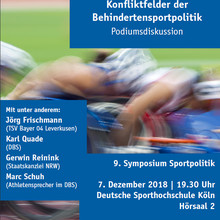
Title: Disabled sports from a sports policy perspective:
Possibilities and limits of political intervention to overcome inequality
Structures - actors - areas of conflict
Date: 7. December 2018
Place: Senatssaal in the DSHS Cologne
In the public perception, disabled sports have so far received only limited attention. Only in the course of the Paralympics, as recently at the Summer Games in Rio and the Winter Games in Pyeongchang, the media and the public's attention is briefly focused on disabled sports.
In this context, the issue of classifications in disabled sports and the decision of the International Paralympic Committee (IPC) to suspend Russia attracted more attention in sports policy, as disabled sports were assigned an important role in the debate on values in sport. Overall, however, little is known about the basic structures, actors and areas of conflict in disabled sport.
For example, the Paralympics represent only one facet of major events in disabled sport. Deaf people compete in the Deaflympics, people with intellectual disabilities in the Special Olympics. The structures of other significant areas such as rehabilitation sports are also rarely in focus, despite some recently published scientific research.
Against this background, the 9th Symposium on Sports Policy will deal with the development and structures of disability sports policy. Within the framework of the symposium, experts from sports policy and association research will come together with representatives from sports policy and administrative practice to discuss, among other things, the policy pursued by the German Disabled Sports Association (DBS), the cooperation with federal ministries, international developments and the extent to which the idea of inclusion in sport is taken into account.
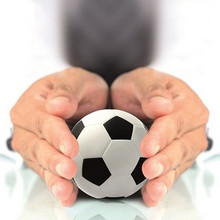
Title: Final Workshop National Sports Governance Observer
Date: 28.11.2018, 1 to 5 pm
Place: Senatssaal, German Sport University, Building 2
Invited are:
- Deutscher Fußball-Bund e.V.
- Deutscher Handballbund e.V.
- Deutscher Leichtathletik-Verband e.V.
- Deutscher Olympischer Sportbund e.V.
- Deutscher Schwimm-Verband e.V.
- Deutscher Tennis Bund e.V.
- Deutsche Triathlon Union e. V.
- Deutscher Turner-Bund e.V.
- Deutscher Volleyball-Verband e.V.
- Landessportbund NRW e.V.
In November 2018, the final workshop of the overall project took place in Leuven (Belgium), bringing together all project partners, journalists, researchers and other interested parties from Europe and abroad. The participants discussed the results of the final report in lectures and panel discussions.
In order to discuss the final results and perspectives with the German partner associations and other interested parties, the Institute for European Sport Development and Leisure Studies invited for another workshop on the 28th November 2018. The aim of this final workshop is to classify and explain the German and European results and to make them available for future good governance activities.
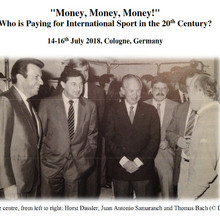
Title: "Money, Money, Money!" - Who is paying for international Sport iin the 20th century?"
Date: 14.-16.7.2018
Place: Senatssaal, Deutsche Sporthochschule Köln
The conference was organised as a cooperation of the Institute of European Sport Development and Leisure Studies and the RERIS network at Deutsche Sporthochschule (Cologne) on 14th ,15th and 16th July 2018. On behalf of RERIS Stefan Scholl (Köln) and Quentin Tonnerre (Lausanne) have been in charge of the international conference that gathered more than 12 speakers from seven European Countries.
The conference contributed to the target to foster reflexion on the economy of sport in an historical perspective which has not attracted braid attention so far. In addition to country studies several sub-branches in sport and a number of case studies have been addressed.
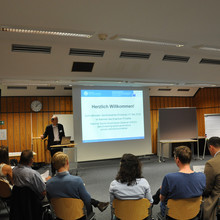
Title: Workshop National Sports Goverance Observer: Case Study of Germany
Date: 15.5.2018
Place: Lecture Hall 5, Hockey-Judo-Centre, German Sport University Cologne
Invited federations:
- Deutscher Fußball-Bund e.V.
- Deutscher Handballbund e.V.
- Deutscher Leichtathletik-Verband e.V.
- Deutscher Olympischer Sportbund e.V.
- Deutscher Schwimm-Verband e.V.
- Deutscher Skiverband e.V.
- Deutscher Tennis Bund e.V.
- Deutsche Triathlon Union e. V.
- Deutscher Turner-Bund e.V.
- Deutscher Volleyball-Verband e.V.
- Landessportbund NRW e.V.
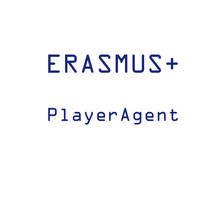
Title: Workshop: From Player Agents to Intermedieries
Date: 2. February 2018
Place: Senatssaal, DSHS Köln
The first meeting of the ERASMUS+ project "Promoting and Supporting Good Governance in the European Football Agents Industry" took place on February, 2nd 2018 at German Sport University Cologne. The focus of this project is to undertake evidence based research in order to promote and support good governance in the context of the regulation of football players’ agents (now referred to as ‘intermediaries’) in the EU. Particular attention will be given to the introduction of the 2015 RWWI, that has refocussed the nature of agent regulation. Under the 2008 PAR, the focus was on regulating the agent and under the RWWI the focus is on regulating the transaction.
Participants:
As Project coordinatior
Edge Hill University
As Consortium Partners:
Deutsche Sporthochschule Köln
Umea Universitet (Schweden)
Universidad Carlos III de Madrid (Espana)
Pravi Fakultet Sveucilista u Rijeci (Hungary)
2017
Title: Changing Sports Development: China and Europe: Inventories, Case Studies and Interactions
Date: 15.-16. December 2017
Place: Senatssaal, DSHS Köln
In the last two decades in China and Europe the mutual interest in the development of politics, economy and culture has increased. The growing awareness of changes in other continental settings has fostered reinforced communication and exchange in general – as well as increased cross-border activities in the field of sports.
Against this backdrop the conference “Changing sports development: China and Europe” was held at German Sport University on December 15th and 16th 2017. Organized by the Institute of European Sport Development and Politics at German Sport University in cooperation with the Euro-China Sport Development Association e.V. the conference brought together German academics with researchers and experts from seven universities and additional organizations in China. In addition to this, a larger number of practitioners from China and Germany contributed to the meeting. The conference followed a clear interdisciplinary approach addressing different academic disciplines from sport management and sport politics up to physical education and high performance sports.
The focal point of the conference was the development of Chinese football targeted in particular by president Xi Jinping. Chinese researchers introduced the current situation of Chinese football and analyzed the achievements and the challenges that Chinese football has made and that China is still facing. Comparing Chinese and German football development and reflecting on transnational interactions a heated debate discussed the next steps for Chinese football and the lessons that can be drawn from German football development.
Following a comparative approach the conference dealt at its second day with sports beyond football and addressed topics such as basketball, golf and swimming. The detailed and empirical grounded contributions of the experts and academics offered deep insights into the current situation of Chinese sport with strong references to both elite sports and mass sport development including aspects such as community sports and sport tourism. The presentations offered reflections on the current situation of sport in China as well as on the transnational interactions with Europe.
The conference focused on case studies about specific metropolises, municipalities and regions in China and Germany. Contrasting studies that perceive Chinas just as an uniform state, this part allowed the participants to learn more about similarities and differences in various Chinese provinces.
The final sessions of the conference dealt with academic collaboration and with the perspectives of the universities and institutes to establish interactions and partnerships in order to promote Chinese-German research on sport development. Even after the end of the conference, cooperation and communication kept on going. All participants agreed that this conference offered incentives for further and deepened interaction in research and teaching
8th Symposium on Sportpolitics: Social relationships in sport
Title: Working relations and representations in sport - in the area of conflict between professional activity and voluntary commitment
Date: 1.-2. December 2017
Place: Senatssaal of the DSHS Köln
New trade unions in sport, athletes seeking their own representation and a growing number of social conflicts - such as the female footballers from Norway and Denmark striking for equal pay - point out that industrial relations and representation in sport face considerable challenges.
While industrial relations have generally been the subject of in-depth scientific research, there is little data and even less analysis available for the specific area of industrial relations in sport. Against the background of the large number of people who are active in sport, in view of the considerable share of sport in the gross domestic product, but also in view of the mobilisation potential and the dynamics of change in sport, this research gap represents a central desideratum of both socio-political and sports science research.
With the aim of taking stock, identifying challenges and making recommendations for action, the 8th Symposium on Sport Policy will take a closer look at the topic and problem area of industrial relations and representations in sport.
Mit dem Ziel, eine Bestandsaufnahme vorzunehmen, Herausforderungen zu identifizieren und Handlungsempfehlungen zu geben, setzt sich das 8. Symposium Sportpolitik eingehender mit dem Themen- und Problemfeld der Arbeitsbeziehungen und Repräsentationen im Sport auseinander.
Workshop: POLIS (Policy and Politics in Sport)
Title: POLIS – Policy and politics In Sport
Date: 04.-05.10.2017
Place: German Sport University Cologne
The first network-meeting of POLIS – Policy and politics In Sport has successfully taken place in Cologne. POLIS aims at a closer cooperation of academics who work in the emerging field of sport politics or who deal with political issues related to sport.
It was the objective of the workshop to explore further perspectives in this field. In addition to disciplinary, methodological and theoretical aspects particular attention has been given to comparative studies in sport politics.
The workshop has not just produced inspiring discussions but also provoked concrete activities that will be carried out in the next months. The summary minutes offer you an overview on results and perspectives.
Workshop: National Sport Governance Observer
Title: National Sports Governance Observer
Date: 29.-31.05.2017
Place: German Sport University Cologne
The first meeting of the research committee of the Erasmus+ project ‘National Sports Governance Observer’ has successfully taken place in Cologne.
The main aim the ‘National Sports Governance Observer: Benchmarking sports governance across national boundaries’ is to assist and inspire national sports organisations to raise the quality of their governance practices.
The project involves in the first instance the partners from the Danish Institute for Sports Studies/Play the Game, German Sports University Cologne, KU Leuven, Molde University College, University Bucharest, University of Warsaw, Utrecht University, and will try to attach partners from third countries inside and outside the EU in the course of 2017 and 2018.
To the agenda of the research meeting
More information about the National Sports Governance Observer
To the project-homepage
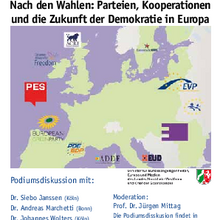
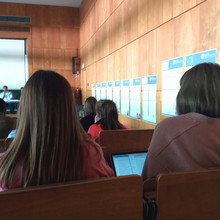
Title: At the aftermath of elections: political parties, cooperations and the future of democracy in Europe
Date: 10.05.2017
Place: German Sport University Cologne
For the 2nd time a panel discussion during the Europwoche 2017 took place at the GSU. About this year's question "At the aftermath of elections: political parties, cooperations and the future of democracy in Europe" a lively discussion took place.
2015
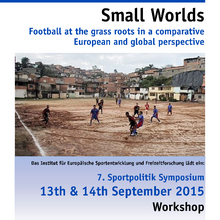
7th Symposium on sport politics: Small Worlds - Football at the grass roots in a comparative European and global perspective
Title: Football at the grass roots in a comparative European and global perspective
Date:12th-13th 09.2015
Place: German Sport University
Though football increasingly attracts the attention of cultural historians, sociologists and social scientists more generally, research to date has focused largely on the elite professional game. Those who participate at lower levels – from non-elite amateur level to street football – have been largely neglected.
Against this backdrop, the workshop will bring together experts from various European countries with a mutual interest in grass-roots football. The intention is to establish a framework of discussion that will faciliate and encourage international and interdisciplinary co-operation and innovative approach more generally.
The workshop is open to academics, students and people generally interested.
Abstract: Nina Degele
Abstract: Conor Curran
Abstract: Darius Zifonun
Abstract: Dilwyn Porter
Abstract: Kristian Naglo
Abstract: Oliver Fürtjes
Abstract: Paul Campbell
Abstract: Christoph Wagner
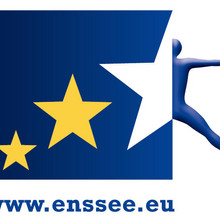
XIII ENSEE Forum
Title: XIII ENSSEE meeting
Date: 9th - 11th 09.2015
Place: Rome
Bi-annual meeting of the EUROPEAN NETWORK OF SPORT SCIENCE, EDUCATION & EMPLOYMENT hosted by the University of Rome "Foro Italico", the Italian University for Sport and Movement.
The main goal of the 2015 Forum of the European Network of Sport Science, Education & Employment is to bring together experts from higher education institutions, sport and physical activity trainers, and related specialists and stakeholders, to discuss about a new educational and training approach in sport professions, based on learning outcomes and competencies, targeting trainees at different qualification levels, fostering partnership between education or training providers and the stakeholders, in search of the best match between the needs of the job market and the qualifications offered.
The ENSSEE Forum will coincide with the European Week of Sport (EwoS),recently announced by the European Commission, to be launched for the first time in 2015.
The XIII Forum of the European Network of Sport Science, Education & Employment will take place on 9 – 11 September 2015 at the University of Rome “Foro Italico”, Rome, Italy.
Main themes include:
- The EU common market and the recognition of sport professions
- The European Qualification Framework within the Sport & Physical Activity sector
- The EC support for international mobility in sport education & training
- The Lifelong Learning Program strategy in sport professions
- Sport and society: time for new sport professions
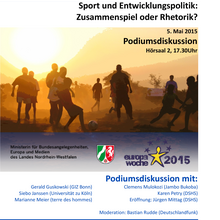
Europe-Week: Sport and Development Policy: Real Interaction or Pure Rhetoric?
Title: Sport und Entwicklungspolitik: Zusammenspiel oder Rhetorik?
Date: 5.5.2015
Place: Deutsche Sporthochschule Köln
Partner: Ministerium für Bundesangelegenheiten, Europa und Medien des Landes Nordrhein-Westfalen
Participants at Public Discussion:
Marianne Meier (terre des hommes), Clemens Mukolzi (Jambo Bukoba), Gerald Guskowski (GIZ Bonn), Karen Petry (DSHS), Sibo Janssen (University Cologne)
Presenter: Bastian Budde (Deutschlandradio)
While policies for development have a long and rich history of projects on national as well as on European level, the topic of “development and sports” has only recently and over the last decade come into the focus of politicians, associations and the broader public. Generally, the debate is dominated by the question, what exactly can be achieved in development with and through sports and exercise. Priority aims in development have always been the fight against poverty, capacity building in education and the improvement of infrastructure; sports-related development activities have therefore always needed extra legitimating. Moreover, there is no reason to believe that needs and motives related to sports and exercise are uniform all over the world. In a similar vein, it constitutes a flawed and misled idea to transfer successful regulations, patterns and curricula from one country to another without further reflection. These highly topical issues inspired a mildly controversial debate amongst experts and the engaged auditorium.

Junior researchers' conference: Doping: Background - Players - Perspectives
Title: Doping: Background - Players - Perspectives
Date: 24th - 26th April 2015
Place: German Sport University Cologne
Partners:
Institut for European Sport Development and Leisure Studies (IESF)
Research-Group Sport of Friedrich-Ebert-Stiftung
Responsible:
Prof. Dr. Jürgen Mittag, Dr. Till Müller-Schoell, Gunnar Risse
Jan-Hendrik Flecke, Jennifer Danquah, Jan Vogt, Lennart Feix
During the workshop the history of doping, definitions and legal matters were disccussed. To understand the difficulties in tracing the substances, there was a visit of the doping laboratory at the German Sport University on the agenda.
Further questions like political and social aspects of doping and the value of anti-doping politics were covered and discussed in different workshops. As a contrast to this an insight view into everyday life of top athletes was given.
International Conference "Playing to build Europe"
Title: International Conference "Playing to build Europe"
Date: 5./6.2.2015
Place: Lausanne
Internationale Konferenz der Université de Lausanne zum Thema« Playing to Build Europe » The formation of a European Football Sphere (1919-1991)
Partners: De Monfort University, Leicester, International Centre for Sports History and Culture (ICSHC)
German Sport University Cologne, Institut of European Sport Development and Leisure Studies (IESF)
Since 1990, football history has greatly expanded within the field of sport science. In particular, historians have worked on professionalization, on the development of football’s institutions or even its mediatisation in a variety of geographic areas and especially Europe; nevertheless, few studies can be considered genuinely continental in their analysis or with respect to their source material. Historians have mainly worked within a national framework, and even collective work remains, for the most part, a collection of national cases. Furthermore, the few existing works really centred on continental football focus primarily on the first half of the twentieth century, even though the period between 1950 and 1980 is fundamental regarding the “Europeanization” of football (creation of a sovereign institution, establishment of specific rules about players’ transfers and contracts and, especially, the development of competitions). Howewer, some authors have already worked on the use of football by the State in their soft power strategies. At the opposite, few research have focused on the role of the football manager’s, who created a true transnational community and permit that football played up geopolitical tensions and often take the “wrong-foot” of political decisions.
With this in mind, the conference permitted discussions and transnational debates about the special place of football on the European scene from 1919 to 1991. Based on many cases and topics, the conference showed the steps of the structuration of a genuine ‘European’ football sphere, studied activities and motivations from managers and finally described the (relative) autonomy of football regarding State policies. The discussions contributed to the rise of some new analysis and indicated suggestions for future research. The conference offered a space of discussion between some young and also more experienced researchers. In this context, the aim was to pursue contacts already established in some European networks, as around the FREE (Football Research in Enlarged Europe) project.
Besides, this new conference can be seen as the continuation of a previous one organised in Lausanne six years ago on the occasion of the European Championship of 2008, which revealed both the place and the role of Switzerland in the development of international football during the twentieth century. Published in a collective volume Le football suisse in 2009, the contributions of this initial research highlighted the necessity to focus on an international level to pursue our understanding of football history.
2014
Conference: Organised Sport in Mediated Modernity
Title: Organised Sport in Mediated Modernity
Date: 20th/21st November 2014
Place: German Sports University Cologne
Researchers of the German Sports University cooperate since 2012 in the project “sport in mediated modernity”. The core ambitions of the four partaking institutes consist of the systematic elaboration and theoretical mapping of those deep changes within the sports- and exercise-cultures of modern societies that have taken place over the last decades and are still going on.
The concluding symposium presented and discussed the results of the research activities, be it the partial endeavours of individual institutes or the broader context. Engaging in a dialogue on the basis of working papers with experts coming from sports science and neighboring disciplines, the symposium outlined which changes in sports- and exercise-culture can claim to be typical for which general trends in society and to what extent these changes have a seismographic function for social change. The organizers are indebted to Fritz-Thyssen-Foundation for the funding of the event.
Link: www.dshs-koeln.de/forschungsschwerpunkt-sport-der-medialen-moderne/
6th Symposium Sport Policy: Sport as Motor for Health Policy? Approaches, Players and Conflicts
Title: 6th Symposium Sport Policy: Sport as Motor for Health Policy? Approaches, Players and Conflicts
Date: 1st November 2014
Place: 7th International Sport-Congress Hamburg
During the 7th international Sport Congress in Hamburg, the German Sport University organized the 6th Symposium Sport Policy with following topics:
Areas of conflict and programmatic activities related to work
Is the pursuit of Health incompatible with modern working conditions or is there room for co-evolution? This section emphasized the enormous social and political relevance of sports and its respective contribution to physical, emotional and social Health on the one hand and the significance of the latter for functioning working environments. Well-known experts in the field with political or associational backgrounds highlighted common ground and diverging interests of the relevant actors in the interplay of health, sports and work.
Politics and policies in local Healthcare: Fostering Health in a network of municipalities, schools and leisure sports? The questions central to this section were: Which positions in local healthcare-provision are held by municipal administrations, politicians and organised sport? Which role can sports and exercise play with regard to health care and prevention? State and associations as well as practices and players in the field of tourism were scrutinised.
International Conference of Sport Government and Governance in Asia
Title: International Conference of Sport Government and Governance in Asia
Date: 16.-19. Oktober 2014
Place: Nanchang, China
The International Conference of Sport Government and Governance 2014, with the title "Sport Government and Governance in Asia - Actors, Structures, Values" is organized by The International Journal of the History of Sport, Routledge. The German Sport University Cologne is together with the Confucius Institute at the University of Western Australia Co-Organizer of the conference. In this framework Prof. Dr. Jürgen Mittag, Head of the IESF, is involved as member of the Academic Committee as well as Keynote Speaker of the conference.
The following pages provide further information about the program and flyer, the Organizing Committee and Keynote Speakers of the Conference.
Sport & EU Conference 2014
Title: Sport&EU Conference 2014: Sport Systems and Sport Governance in Europe: Changes, Challenges and the Multi-Level Perspective
Date: 26./27. Juni 2014
Location: Deutsche Sporthochschule Köln
The 9th annual conference of Sport&EU will be hosted by the German Sport University Cologne from 26th to 27th of June 2014. It is jointly organized by the Department of Political Science of the University of Mainz and by the German Sports University’s Institute for European Sport Development and Leisure Studies. The hosts are Prof. Dr. Jürgen Mittag (Cologne), Prof. Dr. Arne Niemann and Dr. Alexander Brand (Mainz).
The unflagging convergence between sport and other social areas as well as the increasing interference of governmental and non-governmental players on the organisation of sport indicate the growing importance of the relationship between policy-making and sport. The triggered substantial changes within the European sport system in particular and sport governance in general still lack systematic research. Against this backdrop, the conference aims to enhance research on European sport systems in view of either the national and the European level – and its linkages.
Workshop: The Football World Cup in Brasil 2014
Title: The 2014 World Cup in the focus of communication and political science research
Date: 16. May 2014
Place: Deutsche Sporthochschule Köln
The 2014 World Cup has been in the focus of politics and media for months. Stadium construction, population protests and FIFA guidelines have been critically examined in this context, as have media reporting and the working conditions of journalists.
The aim of the workshop was to address these and other current problem complexes and to embed them in the context of research questions and approaches that will be dealt with in the foreseeable future in the scientific consideration of sports communication and sports policy.
In doing so, changes in the subject area of sport as well as in scientific approaches have been perspective. These questions and points of departure were developed in a total of five panels, each of which was introduced by keynote speeches that were discussed in greater detail in subsequent panel discussions.
Further references:
Sportauslandsexperte/expertin 2014
Title: Sportauslandsexperte/expertin 2014
Date: 12. bis 16. Mai 2014
Place: Deutsche Sporthochschule Köln
Vom 12. bis 16. Mai 2014 wurdw bereits zum zweiten Mal im Rahmen des weiterbildenden Zertifikatsstudiums zum Sportauslandexperten ein Workshop rund um internationale Fragestellungen im Bereich „Sport und Entwicklung“ angeboten. Das dreiphasige weiterbildende Zertifikatsstudium wurde 2012 durch eine gemeinsame Initiative des Deutschen Olympischen Sportbundes, des Auswärtigen Amtes und des Instituts für Europäische Sportentwicklung und Freizeitforschung der Deutschen Sporthochschule Köln unter der Federführung von Dr. Karen Petry ins Leben gerufen.
Nachdem nun erste Sportauslandsexperten bereits erfolgreich in Afrika oder Lateinamerika im Einsatz sind, wurden weitere 20 Teilnehmer/innen zu Multiplikatoren im Sinne von Frieden, Toleranz und Verständigung ausgebildet werden. An den fünftägigen Workshop ist eine Praxisphase angeschlossen, in der die Experten in Sportverbänden, Regierungs- und Entwicklungsorganisationen vor Ort zur Förderung des Auf- und Ausbaus von Sportstrukturen, von Breitensport und sozialer Entwicklungen tätig werden.
Weitere Hinweise:
2013
5. Kölner Abend der Sportwissenschaften: Sotschi 2014
Titel der Tagung:
Sotschi 2014 – Sport und Politik. Nichts hören, nichts sehen, nichts sagen?!
Datum:
18. November 2013
Ort:
Deutsche Sporthochschule Köln
Inhalte der Tagung:
Seit jeher nutzen Sportlerinnen und Sportler internationale Großereignisse als Bühne, um auf Menschenrechtsverletzungen oder politische Missstände hinzuweisen. Bekannt und berühmt geworden ist ein Foto, das bei einer Siegerehrung bei den Olympischen Spielen 1968 in Mexiko entstand: Zwei afroamerikanische Sprinter recken ihre behandschuhten Fäuste in die Höhe – und demonstrieren damit gegen die Rassendiskriminierung in den USA. Ein neueres Beispiel: Bei der Leichtathletik-WM 2013 in Moskau fiel eine schwedische Hochspringerin auf, die sich ihre Fingernägel in den Regenbogenfarben lackiert hatte, welche ein Symbol der Lesben- und Schwulenbewegung sind. Dieses Zusammenspiel von Sport und Politik war Thema beim 5. Kölner Abend der Sportwissenschaft. Aktueller Aufhänger: die bevorstehenden Olympischen Winterspiele im russischen Sotschi (07.-23.02.2014). Daher lautete der Titel der von Wolf-Dieter Poschmann moderierten Veranstaltung: „Sotschi 2014 – Sport und Politik. Nichts hören, nichts sehen, nichts sagen?!“.
Während die eigentlichen Hauptdarsteller – nämlich die Sportlerinnen und Sportler – seit langer Zeit auf Sotschi 2014 fokussiert sind, beschäftigen sich Medien und Öffentlichkeit momentan verstärkt mit den gesellschaftlichen und politischen Rahmenbedingungen, die in Russland herrschen. Anstoß zur Kritik gibt vor allem das „Gesetz gegen Propaganda von nicht-traditionellen sexuellen Beziehungen gegenüber Minderjährigen“. Regelmäßig entbrennen im Vorfeld sportlicher Großevents hitzige Diskussionen über die Politik des Gastgeberlandes. Poschmann: „Doch diesmal ist es ein ganzer Strauß von Bedenken, der zwischenzeitlich sogar die Idee eines Boykotts ins Gespräch gebracht hat.“ Axel Hochrein, Bundesvorstand des Lesben- und Schwulenverbandes, betonte die deutliche Tendenz zur Homophobie in Russland. Seiner Meinung nach verstoße das Ausrichterland damit sowohl gegen die Menschenrechte als auch gegen das Regelwerk des Internationalen Olympischen Komitees (IOC), das Diskriminierung verbietet: „In Russland darf dagegen vollkommen ungestraft, Gewalt gegen Homosexuelle ausgeübt werden. Da ist es mir unverständlich, warum ein Land, trotz solcher Politik, überhaupt noch Mitglied des Europarates sein darf.“
Vergabe in der Kritik
An der Frage, warum ein Land, das die Menschenrechte missachtet, überhaupt den Zuschlag für Olympische Spiele bekommt, entbrannte sich eine lebhafte Diskussion, auch unter Beteiligung des Publikums. Univ.-Prof. Dr. Volker Schürmann vom Institut für Pädagogik und Philosophie kritisierte hier insbesondere das IOC, dem es weniger um den Sport, sondern vorwiegend um ökonomische Interessen gehe. Auch in Bezug auf die Menschenrechte nahm er das IOC in die Pflicht und forderte: „Es ist eine Grenze erreicht. Die zentrale Grundlage des Sports ist betroffen. Denn der Ausdruck der Menschenrechtstradition war seit jeher Kerngedanke des Olympischen Sports und dieser Erfüllung sollte auch in Zukunft nachgegangen werden.“ Dieselbe Richtung schlug Univ.-Prof. Dr. Jürgen Mittag, Leiter des Instituts für Europäische Sportentwicklung und Freizeitforschung, ein, indem er eine Reform der Charta forderte und die Legitimationsgrundlage des IOC in Frage stellte: „Kann sich ein undemokratisches Organ innerhalb des Komitees für demokratische Rechte einsetzen?“
„Sportgroßereignisse werden von den Gastgeberländern traditionell dafür genutzt, sich selbst zu inszenieren. Somit wird auch die Vergabe solcher Events immer mehr zu einem zentralen Thema der Sportpolitik“, fügte Mittag erklärend hinzu. Die sportlichen Großereignisse der nächsten Jahre, z.B. Fußball-WM 2022 in Katar, finden verstärkt in Ländern mit autoritären Staatsformen und hoher Korruptionsanfälligkeit statt, die allerdings gleichzeitig als so genannte „emerging countries“ über ein hohes Wirtschaftswachstum verfügen. Hierzu zählen vor allem die BRICS-Staaten (Brasilien, Rußland, Indien, China, Südafrika). „Im Gegensatz zu den dominanten ökonomischen Kriterien spielen humanitäre, menschenrechtliche oder demokratische Überlegungen bei den Entscheidungen oftmals kaum eine Rolle“, begründete Mittag die Tatsache, dass Athletinnen und Athleten ihre Unzufriedenheit immer wieder mit Protestaktionen zum Ausdruck bringen. Auf die Frage einer Zuhörerin, warum denn gerade Länder mit undemokratischen Strukturen oder humanitären Schwierigkeiten den Zuschlag für Großevents erhalten, antwortete Mittag: „Die Dynamik der sogenannten BRICS-Staaten ist im wirtschaftlichen Bereich stärker als im politischen, infolgedessen weisen die gesellschaftlichen und politischen Bedingungen eine ganze Reihe von Defiziten auf. Die Veranstalter und Unternehmen können hier aber weitaus höhere Gewinne erzielen als etwa in den gefestigten Demokratien des Westens, deren Märkte weitgehend gesättigt seien.“
Mündige Athletinnen und Athleten
Auch auf die Rolle der Athletinnen und Athleten auf sportpolitischer Bühne kamen die Diskussionsteilnehmer zu sprechen. Während Prof. Schürmann die Nachhaltigkeit der Protestaktionen von SportlerInnen anzweifelte, äußerte sich Christian Breuer, Athletensprecher des Deutschen Olympischen Sportbundes (DOSB), zuversichtlicher: Proteste während der Olympischen Spiele in Sotschi könnten als Türöffner für politische Veränderungen wirken. „Ob ein mündiger Athlet allerdings Stellung beziehen will oder nicht, ist diesem selbst überlassen. Wir erwarten aber, dass sich die Sportlerinnen und Sportler im Vorfeld ausreichend über die schwierige Thematik informieren und sich auch über mögliche Konsequenzen im Klaren sind“, sagte der Olympia-Teilnehmer im Eisschnelllauf. In erster Linie reisten die Athletinnen und Athleten aber nach Russland, um ihrem Sport nachzugehen. „Der Sport muss oftmals für Themen herhalten, die im Grund andere gesellschaftliche Bereiche, zum Beispiel Wirtschaft, Medien und Politik, regeln müssten“, monierte Breuer.
Einig waren sich die Podiumsgäste, dass die Vergabekriterien von Sportgroßevents überdacht werden sollten, vor allem wenn – wie in Sotschi – offensichtliche Verstöße gegen die Olympische Charta vorliegen. Denn in der steht: „Jede Form von Diskriminierung eines Landes oder einer Person aufgrund von Rasse, Religion, Politik, Geschlecht oder aus sonstigen Gründen ist mit der Zugehörigkeit zur Olympischen Bewegung unvereinbar.“
Weitere Hinweise:
5. Symposium Sportpolitik 2013: Boykotte und Aussperrungen im Sport
Titel der Tagung:
5. Symposium Sportpolitik 2013: Boykotte und Aussperrungen im Sport. Sport und Politik im Widerstreit.
Datum:
12./13. September 2013
Ort:
Bochum, Haus der Geschichte des Ruhrgebiets
Kooperationspartner:
Bundeszentrale für politische Bildung
Inhalte der Tagung:
Medial stark beachtet, doch aus wissenschaftlicher Sicht weitgehend vernachlässigt: Sportboykotte und Sportausschlüsse. Sie gehören zu Instrumenten, die vielfach genutzt wurden und werden, um politische, ökonomische oder gesellschaftliche Ziele durchzusetzen, die in der Regel nicht unmittelbar mit den Interessen des Sports verknüpft sind.
Warum verzichten Athleten oder Athletinnen freiwillig auf die Teilnahme an Sportveranstaltungen? Was sind weitere Formen von Ausschlüssen und welche Wirkungen erzielen diese? Dies sind Fragen, Hintergründe, Formen und Wirkungen von freiwilligem Verzicht und Sportausschlüssen, die die Tagung "Boykotte und Aussperrungen im Sport" am 12. und 13. September im Haus der Geschichte des Ruhrgebiets in Bochum systematisch beleuchtete. Dabei wurden bei der Veranstaltung - organisiert vom Institut für Europäische Sportentwicklung und Freizeitforschung der Deutschen Sporthochschule Köln in Kooperation mit der Bundeszentrale für politische Bildung - neben historischen Boykotten auch aktuelle Debatten sowohl aus deutscher als auch internationaler Perspektive behandelt. Im Rahmen einer öffentlichen Abendveranstaltung am Donnerstag, 12. September, diskutierten Zeitzeugen aus Sport und Politik unter Leitung von Wolf-Dieter Poschmann die Erfahrungen und Wirkungen von Sportboykotten - insbesondere mit Blick auf die 1980er Jahre.
Weitere Hinweise:
Flyer der Veranstaltung
2012
Tagung - Ect Sport!?
Titel der Tagung:
Echt Sport!? - Wie Wirtschaft, Politik, Medien und Medizin den Sport instrumentalisieren
Datum:
29. November 2012
Ort:
Köln, Deutschlandfunk
Kooperationspartner:
Macromedia Hochschule für Medien und Kommunikation
Deutschlandfunk
Deutsche Sporthochschule Köln
Sportinformationsdienst SID
Sporttreff Köln
Inhalte der Tagung:
Sport interessiert und fasziniert Millionen. Millionen begeistern sich für Athleten, die auf dem Spielfeld, auf der Rennbahn, im Wasser, im Schnee, auf dem Eis oder am Turngerät Höchstleistungen erbringen, und Millionen treiben selber Sport. Aber Sport ist auch ein milliardenschwerer Wirtschaftsfaktor, ein global eingesetztes Instrument der Politik, ein Feld vielfältiger Interessen und mancher Skandale und Affären. Sportliche Großereignisse werden benutzt als Propagandainstrumente für politische Systeme und als Tourismus-PR für Länder. Immer wieder missachten Sportler aus eigenem Antrieb oder auf Geheiß von höherer Warte die Spielregeln, manipulieren, dopen und nutzen die neuesten Methoden der Medizin. Viele Medien lassen sich durch Sportvereine oder Institutionen instrumentalisieren, schauen weg, wenn etwas faul ist, und beschränken sich, statt Hintergründe zu analysieren, auf reine Resultatberichterstattung.
Die Tagung führte an die Knotenpunkte der Instrumentalisierung des Sports: Diskutiert wurden die Gründe, die Ausmaße, die Risiken und die Herausforderungen. Die Impulsen der Referenten sowie die Diskussionsbeiträge behandelten folgende Fragestellungen:
- Wie lässt sich das Potential, das im Sport steckt, gewinnbringend nutzen, ohne dass alle Werte auf der Strecke bleiben?
- Wo bleiben die kritische Öffentlichkeit und der kritische Medienblick?
- Welche Erwartungen richten wir an den Sport - politisch, ethisch, touristisch, wirtschaftlich, in Bezug auf Prestige und Unterhaltung?
- Wo bleibt der Sport? Ist er nur noch Ware, Fassade, nur noch Mittel zum politischen Zweck oder zum ökonomischen Zweck?
Die Tagung richtete sich an Interessierte, Sportler, Funktionäre, Journalisten und Studierende.
Weitere Hinweise:
4. Symposium Sportpolitik: Interessenvermittlung und Lobbying im Sport
Titel der Tagung:
4. Symposium Sportpolitik: Interessenvermittlung und Lobbying im Sport
Datum:
2./3. November 2012
Ort:
Hochschule für Angewandte Wissenschaften Hamburg
Inhalte der Tagung:
Die seit 2009 durchgeführten Symposien begleiten den Prozess der Institutionalisierung und Ausdifferenzierung einer Politikwissenschaft des Sports als eigenständige wissenschaftliche Disziplin.
Auf dem diesjährigen Symposium kamen Experten aus der Sportpolitik- und der Verbandsforschung sowie aus der sportpolitischen und -administrativen Praxis zusammen, um Interessenvermittlung und Lobbying im Sport unter besonderer Berücksichtigung unterschiedlicher Formen, Repertoires und Entscheidungsfelder zu untersuchen. Handlungsrationalitäten, Zielorientierungen, Taktiken, Strategien und politische Gelegenheitsstrukturen der Akteure im Sport sowie ressourcenbezogene Betrachtungen, Konflikte, Bündniskonstellationen und Machthierarchien standen zur Diskussion.
Besondere Beachtung widmete das 4. Sportpolitik-Symposium in diachroner Perspektive der Frage, wie sich die Strukturen der Interessenvermittlung in den beiden letzten Dekaden verändert haben. Neben dem kommunalen, regionalen und nationalen Raum soll in diesem Zusammenhang auch der Einfluss der europäischen Ebene Berücksichtigung finden, auf der eine dynamische, sich neu formierende Interessengruppenlandschaft und ein komplexes institutionelles Geflecht aufeinandertreffen.
Weitere Hinweise:
Flyer der Tagung
Flyer 6. Internationaler Hamburger Sport-Kongress
Tagung - Der politische Mensch
Titel der Tagung:
Der politische Mensch - Akteure gesellschaftlicher Partizipation im Übergang zum 21. Jahrhundert
Datum:
10. bis 12. Oktober 2012
Ort:
Bonn, Friedrich-Ebert-Stiftung
Inhalte der Tagung:
Im Europa des 21. Jahrhundert erfährt Politik eine kritischambivalente Bewertung. Das Vertrauen in Problemlösekompetenz, Verantwortungsgefühl und Integrität der „politischen Prominenz“ gilt als beschädigt. Wirtschaftliche und sozialstaatliche Fehlentwicklungen sind in individuellen wie kollektiven Lebenswelten erfahrbar und münden vielfach in der Bewertung, die Volksvertretung regiere an den Sorgen und Nöten der Menschen vorbei. Kein Wunder also, so die vielfach gestellte Diagnose, dass der „Wutbürger“ die Dinge selbst in die Hand nimmt, Parks besetzt, in Gleisbetten „schottert“ und Internetseiten kapert. Obwohl doch der Bürger als weitgehend entpolitisiert gilt.
Die anhaltenden gesellschaftlichen Proteste der letzten Zeit haben nicht nur in Deutschland, sondern in weiten Teilen Europas eine Diskussion über neue Varianten der Bürgerbeteiligung ausgelöst. Vor diesem Hintergrund verfolgte die Tagung das Ziel, Menschen als politisch-gesellschaftliche Akteure in den sozialen Zusammenhängen von individuellen und kollektiven Lebenswelten zu betrachten. Im Rahmen der Tagung wurde im interdisziplinären Dialog zu erörtert, inwieweit gesellschaftspolitische Partizipation im 21. Jahrhundert bedeutsam, d.h. möglich, sinnvoll und/oder notwendig ist.
Die Tagung wurde unter Beteiligung von Nachwuchswissenschaftler/-innen der FES Promotionsförderung organisiert. Sie diente dem vertiefenden Austausch von etablierten Forscher/-innen und Nachwuchswissenschaftler/-innen.
Weitere Hinweise:
Symposium: Sport in China
Titel der Tagung:
Sport in China - Entwicklungslinien und Herausforderungen in transnationaler Perspektive.
Datum:
7./8. September 2012
Ort:
Deutsche Sporthochschule Köln
Kooperationspartner:
Deutsche Sporthochschule Köln
Beijing Sport University
Inhalte der Tagung:
Im Austausch mit China blickt die Deutsche Sporthochschule Köln auf eine lange Tradition zurück. Rektor Tokarski, Hauptinitiator der Forschungskooperation mit der BSU, spricht von mehreren erfolgreich abgeschlossenen Promotionen chinesischer Doktoranden an der Deutsche Sporthochschule Köln, sowie speziellen Trainerschulungsseminaren vor den Spielen in Peking 2008. „Nach diesen Seminaren bei uns, haben die Chinesen angefangen Gold zu sammeln.“
Der zweite Tag, der deutlich im Zeichen der Wissenschaft stand, beleuchtete Leistungssport und Breiten- und Gesundheitssport in China, sowie Nachwuchsförderung und deutsch-chinesische Projekte.
Die Entwicklung von Staat, Wirtschaft und Gesellschaft in China in den letzten Jahren hat nicht nur beträchtliches publizistisches, sondern auch zu-nehmend wissenschaftliches Interesse geweckt. Angesichts der Dynamik des chinesischen Wirtschaftsraumes, aber auch im Hinblick auf den Wandel in der Entwicklung von Staat- und Gesellschaft besteht ein erhebliches Interesse, sich mit China auseinanderzusetzen. Dies gilt nicht zuletzt auch für die Sportentwicklung in China.
Das Symposium befasste sich mit ausgewählten Schwerpunktbereichen der chinesischen Sportentwicklung und beleuchtete zugleich die Perspektiven der deutsch-chinesischen Sportkooperation. Besonderes Augenmerk wurde dabei auf die Bereiche Ökonomie, Leistungssport/Trainingswissenschaft sowie Stadtplanung/Gesundheit/Breitensport und (Zivil-)Gesellschaft gelegt.
Weitere Hinweise:
Tagung - Auf dem Weg zur europäischen Sportpolitik. Entwicklungslinien - Akteure - Problemfelder - Perspektiven
Titel der Tagung:
Auf dem Weg zur europäischen Sportpolitik. Entwicklungslinien - Akteure - Problemfelder - Perspektiven
Datum:
28./29. Juni 2012
Ort:
Deutsche Sporthochschule Köln
Kooperationspartner:
Arbeitskreis Europäische Integration
Deutsche Sporthochschule Köln
Europäische Akademie des Sports
Inhalte der Tagung:
Nicht nur aufgrund des anhaltenden Mobilisierungspotenzials des Sports in den Medien, sondern auch infolge seiner wachsenden Verflechtung mit anderen gesellschaftlichen Handlungsfeldern hat das Zusammenspiel von Politik und Sport erheblich an Bedeutung gewonnen − in jüngster Zeit auch verstärkt im Hinblick auf die europäische Ebene.
Auch nach der Inkorporation des Sports in das Vertragswerk von Lissabon existiert weiterhin keine rechtliche Handlungsermächtigung für eine direkte Sportpolitik der Europäischen Union; dennoch haben sich sportpolitische Entscheidungen zunehmend auf die europäische Ebene verlagert. Zurückführen lässt sich dies nicht allein auf eine verstärkte politische Intervention der EU-Institutionen, sondern auch auf eine immer größere Zahl von Interessenkonflikten im Sport sowie eine Machtverschiebung von nationalen Verbänden zugunsten der Dachverbände, Ligen und großen Klubs.
Mit Blick auf diese Ausgangsbeobachtungen betrachtete die - in Kooperation mit dem Arbeitskreis Europäische Integration und der Europäischen Akademie des Sports ausgerichtete - Konferenz, sowohl die wichtigsten Etappen bisheriger europäischer Sportpolitik als auch zentrale Problemfelder und die wichtigsten Akteure dieses Politikfelds. Die Beobachtungen und Analysen mündeten in einen Ausblick zur künftigen Entwicklung und Organisation des Sports in Europa.
Weitere Hinweise:
2011
7. Play the Game World Conference
Titel der Tagung:
7. Play the Game World Conference an der DSHS Köln
Datum:
03. bis 06. Oktober 2011
Ort:
Deutsche Sporthochschule Köln
Inhalte der Tagung:
„Bringing change to the heart of sport“ – unter diesem Motto fand die 7. „Play the Game“-Konferenz vom 03.10. – 06.10.2011 an der DSHS statt. „Play the Game“ ist eine internationale Konferenz, welche die Werte des Sports stärken will, indem sie die Diskussion über die Förderung von Demokratie, Transparenz und Meinungsfreiheit anregt. Rund 300 Wissenschaftler, Journalisten und Sportfunktionäre sowie Studenten der Sporthochschule werden erwartet. Der internationale Austausch und der Aufbau eines weitverzweigten Netzwerks gehören zu den Zielen der Konferenz. „Play the Game“ dient nicht nur der Präsentation wissenschaftlicher Befunde. Darüber hinaus stellen Sportpolitiker und Verbandsvertreter ihre Positionen vor, berichten Sportler und Trainer über ihre Erfahrungen im Umfang mit den Medien und den Funktionären. Schließlich gewähren Workshops Einblicke in die Praxis des kritischen Sportjournalismus.
Sieben Schwerpunktthemen behandelte die viertägige Konferenz. Neben Wettbetrug ging es um die Anti-Doping-Politik sowie die Verknüpfungen zwischen Doping und organisierter Kriminalität. „Play the Game“ problematisiert die geopolitischen und kommerziellen Interessen hinter den Bewerbungen für Sport-Mega-Events – wie der Fußballweltmeisterschaft in Brasilien und Katar oder den Olympischen Winterspielen in München. Auf der Konferenz wurde ein Index vorgestellt, der die Kosten und Nutzen sowie die Nachhaltigkeit der Sportstätten bewertet. Außerdem wurden Beispiele der gezielten Förderungen des Breitensports gesucht. Diskutiert wurde, wie der Sport als Entwicklungshilfe auftreten kann und ob sich in der EU eine eigene Sportpolitik entwickelt. Ebenfalls wurde auf der Konferenz die Integration der Geschlechter im Sport aufgegriffen – dies wurde speziell für Sportlerinnen in muslimischen Ländern hinterfragt. Schließlich wurde auf den Trend der Technisierung des Sports eingegangen, indem beispielsweise der wachsende Sektor der Sport-Computerspiele oder die hitzige Debatte über die technische Unterstützung von Schiedsrichter-Entscheidungen thematisiert wurde.
Die „Play the Game“-Konferenz 2011 wurde gemeinschaftlich organisiert vom Institut für Biochemie, dem Institut für Kommunikations- und Medienforschung, dem Institut für Europäische Sportentwicklung und Freizeitforschung, in enger Zusammenarbeit mit der Stabsstelle Presse und Kommunikation, dem Hochschulmarketing und den dänischen Kollegen des Vereins „Play the Game“.
Am Institut für Europäische Sportentwicklung und Freizeitforschung sind Dr. Michael Groll und Katharina Hänsch für Play the Game verantwortlich.
Weitere Hinweise:
Erste gemeinsame Konferenz “Innovation and Practise” von ENSSEE und ICCE
Titel der Tagung:
Innovation and Practice
Datum:
25. bis 27. August 2011
Ort:
Paris
Inhalte der Tagung:
Vom 25. – 27. August 2011 fand in Paris die erste gemeinsame Konferenz „Innovation and Practice“ der international arbeitenden Netzwerkorganisationen “European Network of Sport Science, Education and Employment” (ENSSEE) und “International Council for Coach Education” (ICCE) in Paris statt.
Das Forum mit dem Titel “A Platform for Sport Education and Employment in Europe” beleuchtete die Bereiche Innovation, Best Practise sowie die neusten Entwicklungen in den Bereichen Ausbildung, Arbeit und Training im europäischen Sportsektor.
In Anlehnung an den Lissabonner Vertrag und das Weißbuchs Sport wurde hiermit eine Plattform zur Analyse von entstehenden Trends, Anforderungen und Aspekten in den Bereichen Coaching, physische Aktivität, gesunder Lebensstil, Sportunterricht und Sportmanagement geschaffen.
Weitere Hinweise:
ENSSEE
INSEP
European Sport Education Information Platform
3. Symposium Sportpolitik 2011: Sportgroßereignisse als Herausforderungen an die Sportpolitik
Titel der Tagung:
3. Symposium Sportpolitik 2011: Sportgroßereignisse als Herausforderungen an die Sportpolitik
Datum:
9./10. Juni 2011
Ort:
Deutsche Sporthochschule Köln
Inhalte der Tagung:
Der Prozess der Ausdifferenzierung und Institutionalisierung einer Politikwissenschaft des Sports als eigenständiger Disziplin innerhalb der Sportwissenschaft hat in den letzten Jahren deutlich an Dynamik gewonnen.
Hierzu haben auch die jährlichen Sportpolitik-Symposien beigetragen.
Das Sportpolitik-Symposium 2011 setzte diesen Weg fort. Im Mittelpunkt der Tagung stand das Thema „Sportgroßereignisse als Herausforderungen an die Sportpolitik“. Beleuchtet wurden in diesem Zusammenhang, sowohl einzelne Sportgroßereignisse, als auch strukturelle Rahmenbedingungen und Akteure, die Einfluss auf die Sportgroßereignisse nehmen. Wie in der Vergangenheit wurden dabei auch benachbarte Forschungsfelder berührt und grundsätzliche Fragestellungen behandelt.
Am 09. Juni hielt Prof. Dr. Peter Sloterdijk zum Thema "Du musst dein Leben ändern! Sport als eine Leitidee der gesellschaftlichen Entwicklung?" einen Vortrag. Ein Erfahrungsbericht hierzu von Simon Drießen (DSHS):
In den Gängen und auf der Homepage der Sporthochschule war es seit Wochen zu lesen – Peter Sloterdijk kommt an die SpoHo! Entsprechend voll war der Hörsaal 2 als der 63-jährige Philosoph am Donnerstag die Bühne betrat. Neben viel „Hochschulprominenz“, wie dem Rektorat, und den Kongressteilnehmerinnen und -teilnehmern waren auch viele Studierende zum Vortrag im Rahmen des Symposiums „Sportgroßereignisse als Herausforderungen an die Sportpolitik“ gekommen.
Professor Jürgen Mittag, Organisator des Kongresses, brachte zur Begrüßung seine Freude über den Besuch Sloterdijks zum Ausdruck und stellte den Zusammenhang zwischen Symposium und Vortrag her: „Sportgroßereignisse sind keine Erfindung der Gesellschaft des 20. Jahrhunderts, sondern waren bereits in der Antike – nicht zuletzt bei den Olympischen Spielen – verankert.“
Vortragsreihe - Sport und internationale Entwicklungszusammenarbeit
Titel der Tagung:
Sport und internationale Entwicklungszusammenarbeit - Empirische Ansätze, Projekte und Evaluation
Datum:
5. Mai bis 14. Juli 2011
Ort:
Deutsche Sporthochschule Köln
Inhalte der Tagung:
Der Auftakt zur Vortragsreihe "Sport und internationale Entwicklungszusammenarbeit - Empirische Ansätze, Projekte und Evaluation" fand am 5. Mai in der Zeit von 14:00 bis 15:30 Uhr im Senatssaal (IG II) statt. Dabei sprach Referentin Marie Biermann von der Universität Paderborn zu dem Thema "Sport als Medium zur Erreichung der UN-Milennium-Ziele - Anspruch und Wirklichkeit".
Weitere Termine im Rahmen dieser Vortragsreihe:
19. Mai, 16:00 - 17:30 Uhr
Sebastian Rockenfeller (DSHS Köln)
"Sportentwicklung in Tansania - Das Projekt "Jambo Bukoba"
26. Mai, 14:00 - 15:30 Uhr
Susanne Gaerte (DSHS Köln)
"Das Projekt "Colombianitos" - eine Evaluationsstudie"
14. Juli, 14:00 - 15:30 Uhr
Clever Chikwanda (University of Western Cape, South Africa)
"Monitoring and evaluation of provincial sport federations in South Africa"
Frauenfußball – (Kein)Abschied vom großen Unterschied
Titel der Tagung:
Frauenfußball – (Kein)Abschied vom großen Unterschied
Datum:
13. April bis 13. Juli 2011
Ort:
Bochum
Inhalte der Tagung:
1) Geschichte der Frauenfußball-WM - Profilsuche mit Hindernissen
Termin: 13.4.2011
Ort: Haus der Geschichte des Ruhrgebiets
Clemensstrasse 17-19, 44789 Bochum
Prof. Dr. Jürgen Mittag (Deutsche Sporthochschule Köln)
2) Ultras, Hools und Pyrotechnik - Fankurven als rechtsfreie Zonen?
Termin: 4.5.2011
Ort: Hörsaal der Archäologie am Bergbaumuseum
Am Bergbaumuseum 31, 44791 Bochum
Prof. Dr. Thomas Feltes (Kriminologie, RUB)
Dr. Martina Schreiber (FH öffentliche Verwaltung NRW / Polizeiakademie der Niederlande)
3) 11 Freundinnen? - Motive für Fussball bei Mädchen und Frauen
Termin: 18.5.2011
Ort: Haus der Geschichte des Ruhrgebiets
Clemensstrasse 17-19, 44789 Bochum
Dr. Heiner Langenkamp (Sportpsychologie, RUB)
4) Das Stadion bebt - Bautechnische Lösungen für moderne Arenen
Stadionbesichtigung im Anschluss
Termin: 8.6.2011
Ort: VfL Stadion
Castroper Str. 145, 44791 Bochum
Prof. Dr.-Ing. Rüdiger Höffer
Dipl.-Ing. Jörg Sahlmen (Windingenieurwesen und Strömungsmechanik, RUB)
5) Fußball und Medien - Eine Symbiose für 80 Millionen Trainer ...
Termin: 29.6.2011
Ort: Fanmeile im Bermudadreieck
Thomas Helmer, Moderation
Dr. Jörg-Uwe Nieland (Deutsche Sporthochschule Köln)
Sandra Minnert (WM Botschafterin, Weltmeisterin 2007)
Frank Goosen (Aufsichtsrat VfL Bochum)
Martina Esser (WDR, Aktuelle Stunde)
Dirk Graalmann (WAZ-Sportchef)
6) Frauenfußball: mehr als nur ein Sommermärchen – Falls das Management stimmt
Termin: 13.7.2011
Ort: Haus der Geschichte des Ruhrgebiets
Clemensstrasse 17-19, 44789 Bochum
Prof. Dr. Marie-Luise Klein (Sportmanagement, RUB), Dr. Markus Kurscheidt (Deutsche Sporthochschule Köln)
Weitere Hinweise:
www.ruhr-uni-bochum.de/wissenstransfer/dialog/offener-hoersaal/hoersaal-city/index.html
Die Macht des Sports - Zugänge, Problemfelder und Leitbilder
Titel der Tagung:
Die Macht des Sports - Zugänge, Problemfelder und Leitbilder
Datum:
8. März 2011
Ort:
Konferenzraum im Clubhaus/Olympiapark Berlin
Inhalte der Tagung:
Die Macht des Sports - Zugänge, Problemfelder und Leitbilder, war die zweite Tagung der Forschergruppe "Sport und Gesellschaft" und fand unter der Schirmherrschaft des Staatssekretärs für Sport der Senatsverwaltung
für Inneres und Sport des Landes Berlin und in Verbindung mit dem Wochenschau Verlag (Schwalbach/Ts.) statt.
Der zweite Workshop der gemeinsam von der Deutschen Sporthochschule Köln und dem Verein "PLAY!YA" gegründeten Forschergruppe "Sport und Gesellschaft" verfolgte das Ziel, die Gestaltungs- und Handlungspotenziale sowie die Leitbilder und Zielsetzungen von Akteursgruppen mit Blick auf übergeordnete Problemfelder im Sport zu beleuchten. Näher berücksichtigt wurden dabei die Bereiche Politik, Medien, Wirtschaft und Bildung. Zu Fragen war in diesem Zusammenhang, welche rechtliche und gesellschaftspolitische Verankerung dem Sport zukommt, inwieweit diese Strukturen hilfreich oder reformbedürftig sind und welche Zielsetzungen und Erwartungen an den Sport gerichtet werden.
Der Workshop setzte sich aus zwei Teilen zusammen: Während in der Nachmittagsveranstaltung die einzelnen Problembereiche systematisch analysiert werden, bot die öffentliche Podiumsdiskussion am Abend auch die Möglichkeit zur Teilhabe für ein größeres Publikum.
2010
2. Symposium Sportpolitik 2010: Sportpolitik zwischen Governance und Regulierung - Macht oder Ohnmacht des Sports in der Politik?
Titel der Tagung:
2. Symposium Sportpolitik 2010: Sportpolitik zwischen Governance und Regulierung - Macht oder Ohnmacht des Sports in der Politik?
Datum:
24./25. Juni 2010
Ort:
Deutsche Sporthochschule
Inhalte der Tagung:
Der Prozess der Ausdifferenzierung und Institutionalisierung einer Politikwissenschaft des Sports als eigenständiger Disziplin innerhalb der Sportwissenschaft hat in den letzten Jahren deutlich an Dynamik gewonnen.
Im Mittelpunkt des jährlichen Sportpolitik Symposiums stand im Juni 2010 das Thema „Sportpolitik zwischen Governance und Regulierung - Macht oder Ohnmacht des Sports in der Politik?“
2009
Vortragsreihe: Sport und internationale Entwicklungszusammenarbeit 2009
Titel der Tagung:
Sport und internationale Entwicklungszusammenarbeit
Datum:
November 2009 bis Januar 2010
Ort:
Deutsche Sporthochschule Köln
Inhalte der Tagung:
Von November 2009 bis Januar 2010 fand an der Deutschen Sporthochschule Köln die Vortragsreihe "Sport und internationale Entwicklungszusammenarbeit" statt. Verschiedene Referenten aus unterschiedlichen Bereichen und Organisationen konnten einen Überblick über das Thema Sport und Entwicklungszusammenarbeit geben.
Im Sommer 2010 wurde ein Buch veröffentlicht, mit verschiedenen Beiträgen zum Thema (unter anderem von den Referenten der Vortragsreihe). Zu finden unter "Monografien".
Das Thema „Sport for Development“ erfährt seit einigen Jahren eine zunehmende Bedeutungssteigerung. Die Vereinten Nationen haben diese Entwicklung maßgeblich gefördert. Mit der Bestellung des „Special Adviser to the UN for Sport for Deleopment“ (erst Adolf Ogi, seit 2008 Willi Lemke), der Einrichtung der „Sport for Development and Peace International Working Group“ und den Konferenzen in Magglingen, die mit dem Appell schlossen, dass der Sport seinen Beitrag zur Erreichung der „Millenium Development Goals“ der Vereinten Nationen leisten soll, wurden wichtige Meilensteine gesetzt.
Das Forum Sportpolitik und das Institut für Europäische Sportentwicklung und Freizeitforschung der Deutschen Sporthochschule Köln wollen den Sport stärker in der Entwicklungshilfe positionieren. Nach der erfolgreichen Organisation von For More – Development through Sport, speziellen Aktionstagen zum Thema Sport und Entwicklung im Sommersemester 2009, sollte nun eine Gastvortragsreihe das Themengebiet inhaltlich tiefergehend bearbeiten.
Die Vortragsreihe deckte die ganze Bandbreite des Themas ab und präsentierte Redner aus den Bereichen Politik, Sport und Wissenschaft. Aus dem Bereich der Politik wurden beispielsweise Vertreter des Auswärtigen Amts und des Bundesministerium der Verteidigung erwartet und die Rolle von Nichtregierungsorganisationen wurde durch Vertreter von etablierten Institutionen wie GTZ und INWENT beleuchtet.
Mit der Vortragsreihe sollte das Thema Sport und internationale Entwicklungszusammenarbeit unter den Studenten der Deutschen Sporthochschule Köln weiter bekannt gemacht und fundierte Einblicke in die Praxis der Entwicklungszusammenarbeit ermöglicht werden. Die erweiterte sportwissenschaftliche Community wird durch die Publikation in der Schriftenreihe der Deutschen Sporthochschule Köln an den Erkenntnissen der Vortragsreihe teilhaben können.
Referenten der Vortragsreihe:
Pamina Haussecker, Inwent: Projekt "Südafrika 2010 - Deutschland 2006: Partnerschaft mit Kick"
Hubert Hartmann, GTZ: Entwicklungspolitik und die Rolle von NRO´s: "Football-in-Development"
Dr. Werner Steinmann, Auslandstrainerschule Mainz: Auslandstrainerschule Mainz - Ein Beitrag zur internationalen Sportförderung desAuswärtigen Amtes
Werner Wnendt, Auswärtiges Amt: Internationale Sportförderung aus Sicht des Auswärtigen Amtes
Uli Jäger, Instut für Friedenspädagogik: Fußball für Frieden und Entwicklung
Willi Lemke, Vereinte Nationen: Sport und Entwicklungsarbeit aus Sicht der Vereinten Nationen
Role of sport in Europe – Future challenges and strategies
Titel der Tagung:
Role of sport in Europe – Future challenges and strategies
Datum:
23./24. Juni 2009
Ort:
Deutsche Sporthochschule Köln
Inhalte der Tagung:
Experten diskutierten zur Rolle des Sports in Europa - Erste Sportkonferenz nach dem Nein der Iren zum Vertrag von Lissabon
Es gibt für den Sport in der Europäischen Union noch viele Herausforderungen zu bewältigen. Dabei ist das Nein der Iren zum Vertrag von Lissabon, der dem Sport einen eigenen Artikel und damit mehr Geld für Forschung bescheren würde, nicht förderlich. Trotzdem lassen sich die Sport-Experten nicht davon abschrecken, die Herausforderungen anzunehmen; dies ist zumindest der Eindruck, den die vom Institut für Europäische Sportentwicklung und Freizeitforschung der Deutschen Sporthochschule Köln und der Europäischen Akademie des Sports Velen e.V. in Kooperation mit dem European Network of Sport Science, Education & Employment (ENSSEE) organisierte Konferenz mit dem Titel „Role of sport in Europe – Future challenges and strategies“ vermittelte.
Im Rahmen der Konferenz, die am 23. und 24. Juni 2008 im Sportschloss Velen stattfand, gaben hochkarätige Experten aus Politik, Sport und Wissenschaft Einblick in zukünftige Handlungsoptionen des Sports im Zuge einer weiter voranschreitenden Europäisierung. So bewertete Michal Krejza, Leiter der Sport-Unit der Europäischen Kommission, den im Weißbuch des Sports angeregten Strukturierten Dialog der Kommission mit allen Beteiligten des Sports als gute Grundlage für einen verbesserten Informationsaustausch. Viel Zustimmung erhielt auch Prof. Dr. Ken Hardman von der Universität Worcester, der konkretere Forschungen hinsichtlich der sozial integrativen Funktionen des Sports und eine europaweite Erhöhung der Sportstunden in der Schule anmahnte.
Weitere Redner, die vom Rektor der Deutschen Sporthochschule, Univ.-Prof. Dr. mult. Walter Tokarski und dem stellvertretenden Präsidenten der Europäischen Akademie des Sports, Franz-Josef Probst, begrüßt wurden, waren u.a. Karl-Heinz Schneider (Bundesministerium des Innern, Leiter EU-Referat), Folker Hellmund (Leiter EU-Büro des Sports), Prof. Dr. Ian Henry (University of Loughborough), Prof. Dr. Maarten van Bottenburg (University of Utrecht), die Juristen Mark-E. Orth und Tim Eller (ArneckeSiebold) sowie Jonathan Hill (UEFA, EU Affairs) and Emanuel Macedo de Medeiros (CEO der European Professional Football League EPFL), die den europäischen Fußball repräsentierten.
Die in den Workshops erarbeiteten Anregungen fließen in die Abschlussdokumente ein, die das Institut für Europäische Sportentwicklung und Freizeitforschung der Deutschen Sporthochschule Köln der Europäischen Kommission vorgelegt hat.
